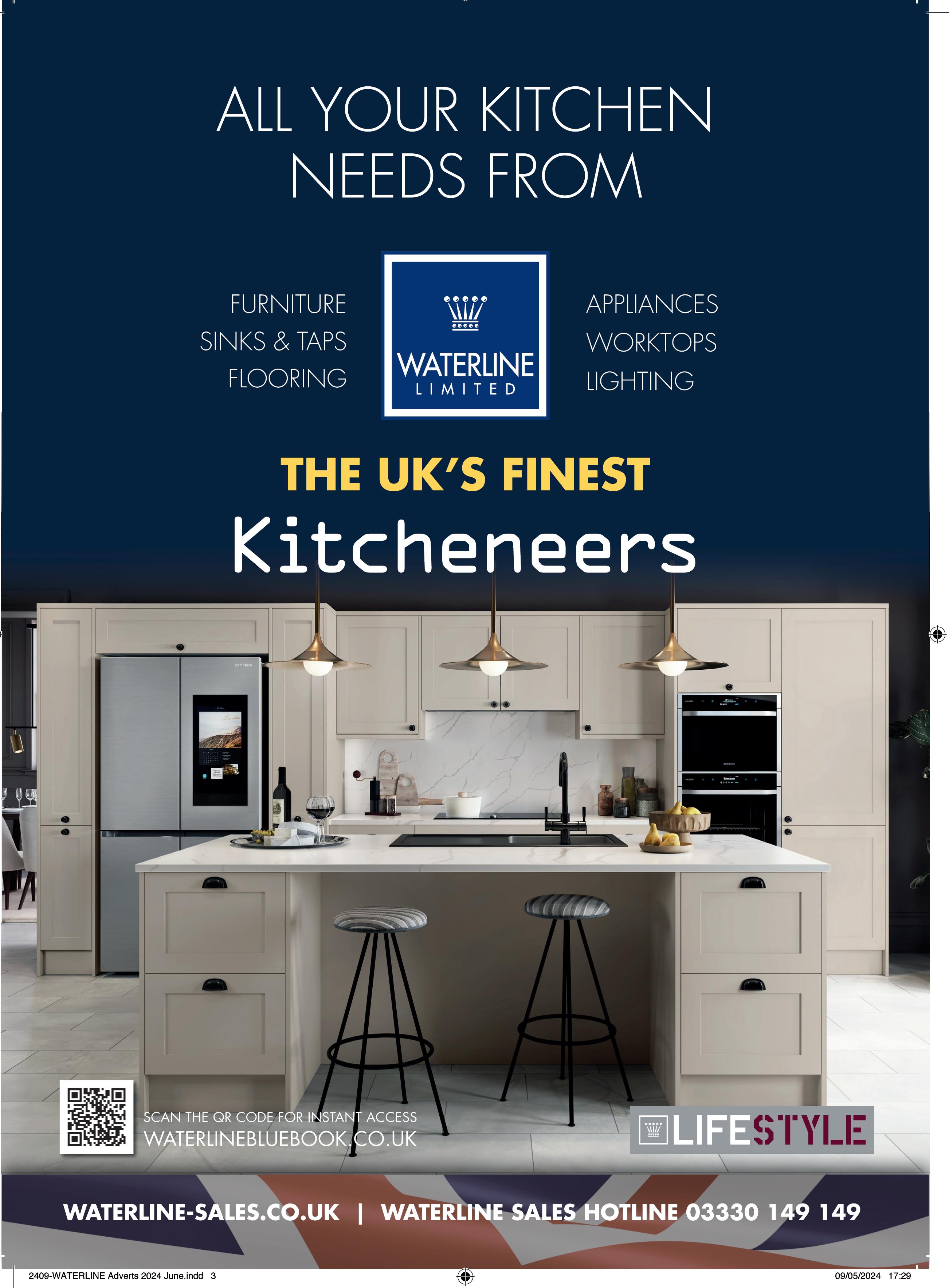KITCHENS & BATHROOMS NEWS

Co-founder James Herriot on 40 years of kitchen design
HANSGROHE


Inside the new UK headquarters and how it supports retailers




Co-founder James Herriot on 40 years of kitchen design


Inside the new UK headquarters and how it supports retailers


5First word
Editor’s comment
6News
Round-up of industry headlines
9People
Appointments and promotions
11Talking shop
Founder of KBBsupport.com Toby Griffin looks at why sales conversions can vary – wildly – in the industry and suggests a way of clear measurement for retailers
12Round table
We ask directors at Hill’s Panel Products (HPP) about challenges in the KBB industry to find out what retailers can learn from their experience
14Interview
Founder of Callerton James Herriot explains how kitchen projects have evolved, common mistakes made by designers, and the future of design training
16Retailer focus
Owners of Staffordshire-based plumbing firm Beth Colley and Andy Galletely explain the journey to open a luxury bathroom studio and the role 4D CAD played
18Supplier profile
Inside Hansgrohe UK’s new HQ in Warwick and how it will boost retailer support with improved accessibility, enhanced stock, and training for their installers under one roof.
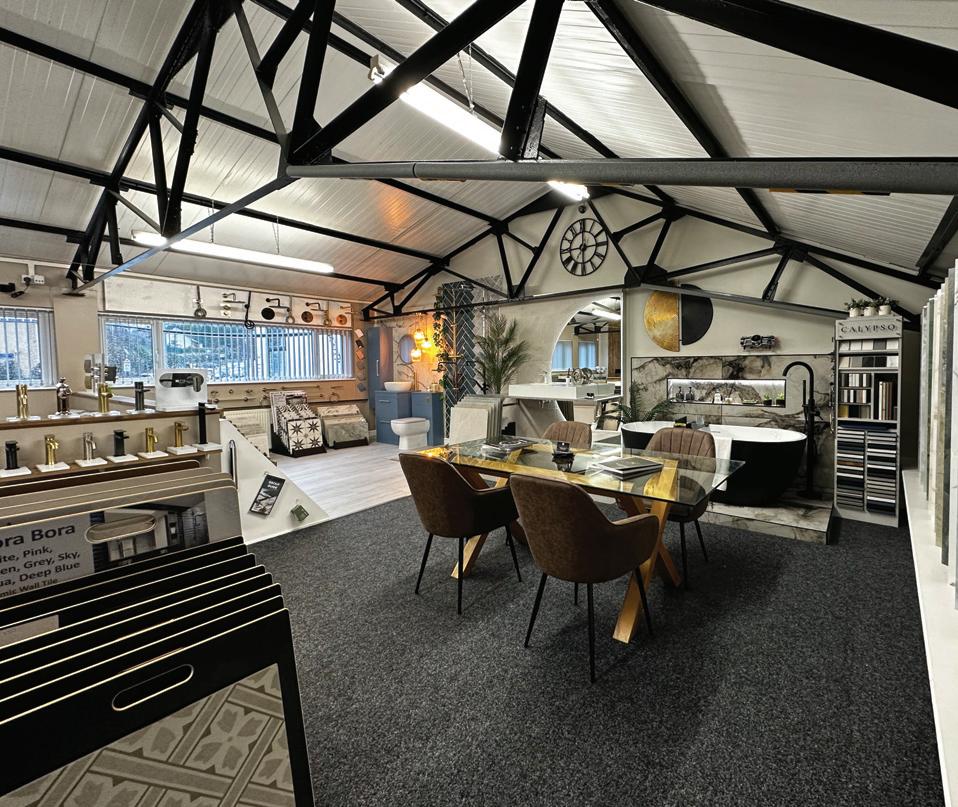
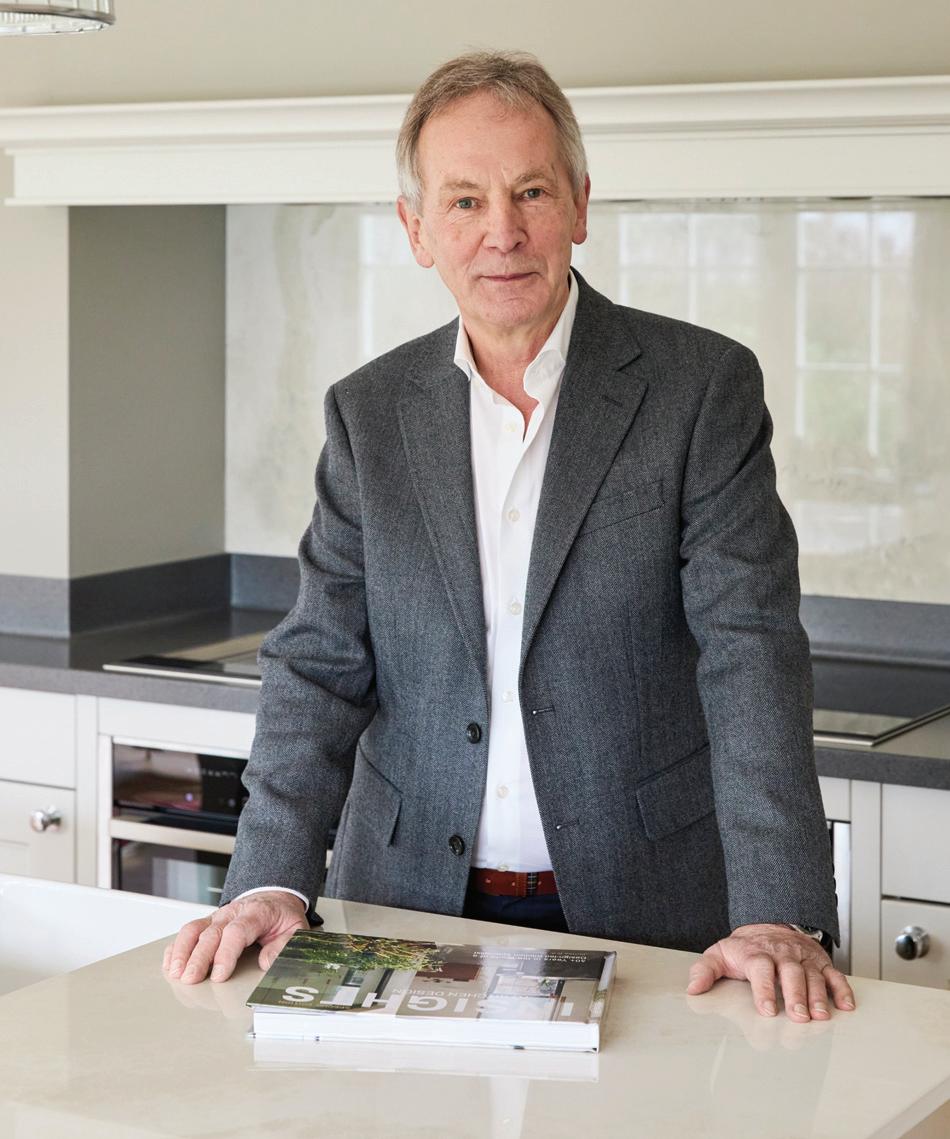
21Kitchen furniture
How the in-frame kitchen has evolved to appeal to a broader church of consumers, becoming simpler to design and install and more cost-effective
24Just out
Latest kitchen products
26Baths
Inspired by nature, baths have embraced fluid forms with organic curves to provide a relaxing space.
28Shower trays
After colours and increased size options, KBN reports the greatest trade ups in shower trays may not be immediately obvious to bathroom designers
30Just out
Latest bathroom products
32Company matters
SME advice offering support across sales, management, financial, marketing and social media topics
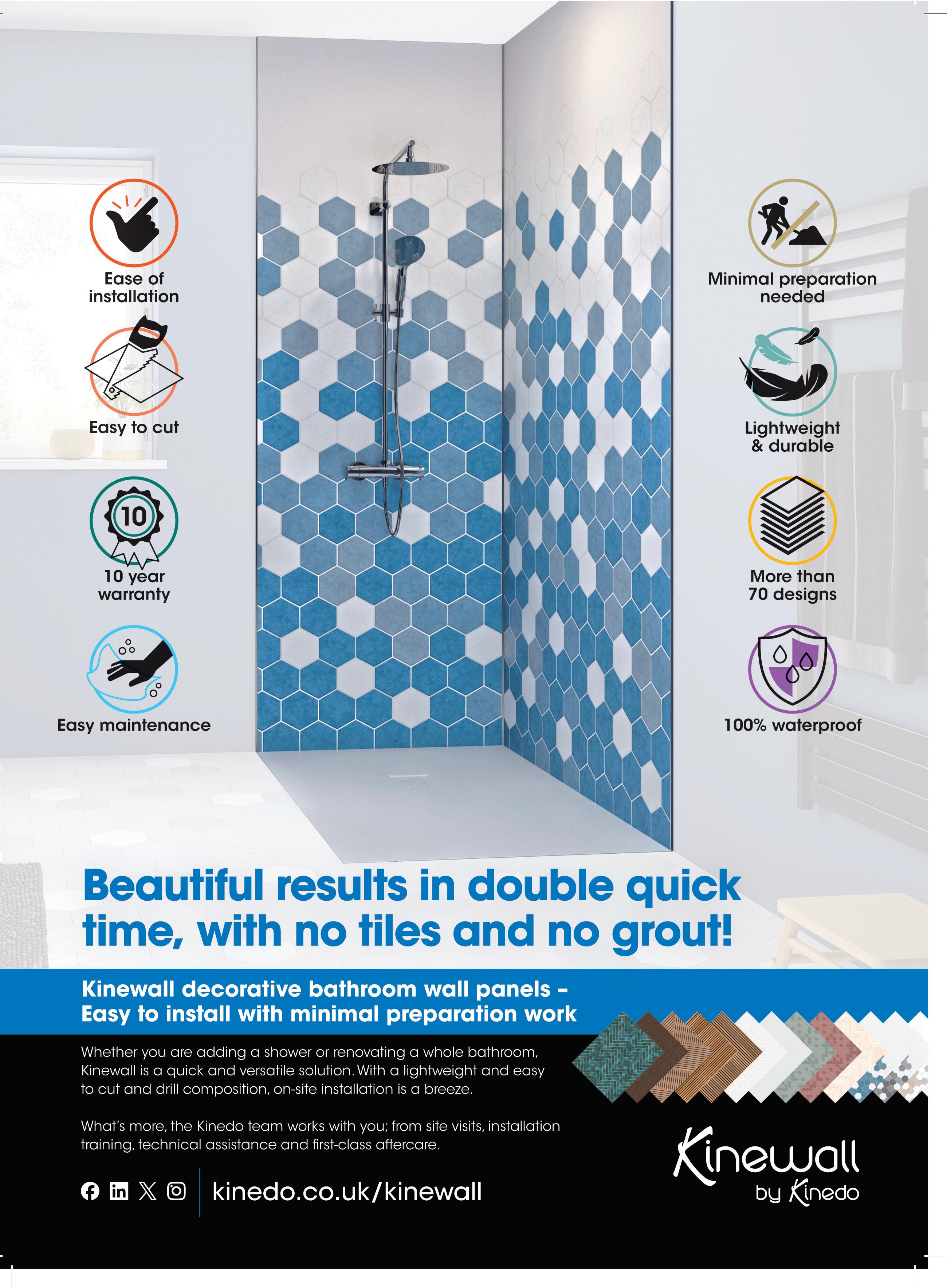
As we reach the mid-point of the year, half the battle is already won. The UK is officially out of recession, with Gross Domestic Product (GDP) growth at 0.6% between January and March 2024, according to offical figures. Compared with the same quarter a year ago, GDP has increased by 0.2% in 2024.
Inflation rates are continuing to trend downwards at 3.2% in March, which according to the Office of National Statistics, is down from a peak of 11.1% in October 2022. National Insurance was cut in the Spring Budget, offering more disposable income for consumers. And while interest rates are currently 5.25%, the Bank of England states they are heading in the right direction, with economic forecasters suggesting possible cuts during summer.
So does that mean the challenge for KBB retail is over? Well, there seems to be an improving economic picture, as the British Chamber of Commerce (BCC) has upgraded growth expectations for

2024 and 2025. But the BCC also reports the recovery remains fragile and expects a weak rebound in consumer spending. It seems the challenging market for KBB retail is not quite in the rear view mirror but we are on the long and winding road to recovery.
So how can retailers continue to combat uncertainty? Remain positive, stated the directors of HPP at a recent round table, and added businesses should concentrate on what you can influence, as there is work out there it’s just how long and how hard you have to work to get it.
While the New Year is the traditional
time to review and rejuvenate business, perhaps it’s time to consider strategies halfway through 2024. What is working well? Where could margins of improvement take place? What new ideas/market sectors could you exploit and what training or knowledge do you need to set new standards and lead your business into achieving new goals?
Whether it’s attracting, converting or increasing the value of orders from customers, retail is a continuous mission to meet the needs of today’s demanding consumers. This is even more important in a competitive market, with an array of businesses competing for consumer spend. Ultimately slowing down progress in retail can mean stagnation.
Looking at expertise both inside and outside the KBB industry, past and present, could offer new ways of thinking. Kitchen and bathroom retail is an exciting and ever-evolving industry and continuing to seek inspiration will ensure you are part of that progression.

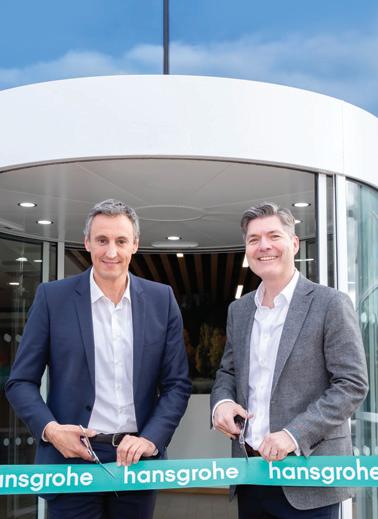

Editor
Philippa Turrell
e: pturrell@hamerville.co.uk
Designer
Donna Booth
Group Production Manager
Carol Padgett
e: carol@hamerville.co.uk
Group Advertisement Manager
Craig Jowsey
e: craig@hamerville.co.uk

Advertisement Manager
Marcus Hooper
e: mhooper@hamerville.co.uk
Digital Manager
Jasmine Smith
e: jsmith@hamerville.co.uk
Digital Assistant
Lydia McFarlane
e: lmcfarlane@hamerville.co.uk
Printer
Stephens & George Ltd


Kitchens & Bathrooms News, Hamerville Media Group Ltd, Regal House, Regal Way, Watford, Herts, WD24 4YF.
Editorial & Sales Enquiries Phone: 01923 237799

ABC total average net circulation 13,505 (for 11 issues distributed between January to December 2022)

Sink, tap and household appliance manufacturer Franke UK has appointed Craig McIntyre as managing director, who has over two decades of service with the company.
His appointment follows the departure of Neil Clark, who recently stepped down following more than 19 years, to take up the role of managing director of Sealy UK.
According to Franke, McInytre aims to build upon Neil Clark’s legacy by expanding
Franke’s product categories to meet evolving customer needs.
His priorities include gaining a “deep” understanding of Franke UK’s employees, markets, customers and products, fostering “continuous improvement”, and investing in employee development for the long-term success of the business.
McIntyre started working for the Franke Group 22 years ago and most recently has led Franke South Africa for 11 years.
He takes up the role of UK
MD and heads up the NESSA Cluster organisation of Northern Europe, Sub-Saharan Africa, UK, Norway, Sweden, Denmark, The Netherlands and South Africa.
Speaking of his appointment, Craig McIntyre commented: “I am proud and grateful for being given the opportunity to lead Franke UK and I’m looking forward to working with the company’s employees, customers and key stakeholders to develop meaningful longterm relationships.
Northern Irish KBB furniture manufacturer and supplier Woodlands Kitchens has acquired Dundee-based JTC Furniture Group, backed by investor BGF.
Founded in 1987 by Brian McCloskey as a kitchen showroom in Ballymena, Woodlands Kitchens is now led by his son Connor.
Manufacturing and supplying kitchen, bedroom and bathroom cabinets, Woodlands Kitchens serves national clients, including home improvement chains Wickes, Travis Perkins and distributor PJH, and has a turnover of over £25m,
Woodlands Kitchens employs more than 170 staff in its facility in Rasharkin, County Antrim.
JTC is a Scottish manufacturer and supplier of fitted furniture, focused on the
social housing and student accommodation markets, and employs over 250 people in the Dundee area.
JTC’s existing senior management team will remain with the newly-combined business, and will continue to lead implementation of its growth plans.
The combined business will have a turnover over £50m and, according to Woodlands Kitchens, JTC represents a complementary acquisition, allowing the scale of the group to enhance its product range and service levels.
BGF’s Talent Network have also introduced Marcus Moir to the business as non-executive chairman, who brings with him a wealth of industry experience in the home improvement space.
CEO at Woodland NI Connor
McCloskey said: “Woodland has enjoyed strong organic growth in recent years but we have kept one eye on strategic, additive acquisition opportunities.
“The partnership with JTC was a move that made perfect sense in terms of scale, common values, capabilities and level of ambition.
“JTC’s strong presence and longstanding customer base in the social housing, healthcare and student housing sectors, combined with Woodland’s own strengths in the distribution and large retail space, will allow both businesses to share best practice and take a collaborative approach to further growth.
“We look forward to working with the team in Dundee.”
Managing director of JTC, Gordon Linton said: “We are convinced the strategic alliance
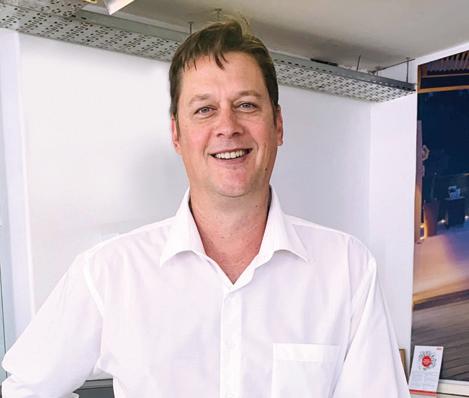
“Having been with the Franke Group for over two decades, I am committed to leveraging my experience and insights to drive sustainable growth and profitability in the UK market.”
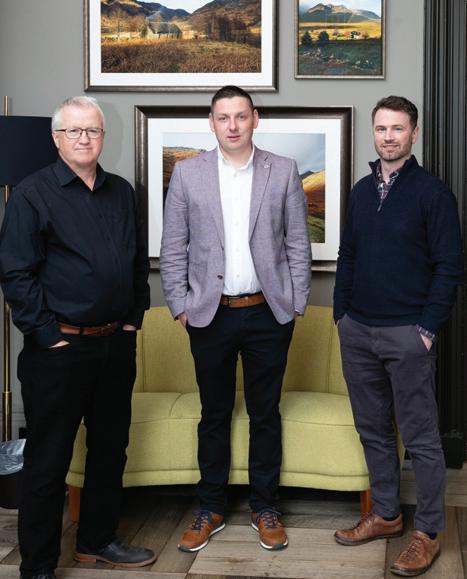
with Woodland, with a proven, supportive backer such as BGF, will strengthen our own proposition and help develop our offering.
“For our team in Dundee, it will be very much business as usual, with a continued focus on providing great service to customers in the range of sectors where we are already a market leader.”
HNH Group and Tughans LLP advised Woodland NI. Thorntons advised JTC and HNH Group and A&L Goodbody advised BGF.
Decision taken to protect long-term success
Ceramic and porcelain coverings manufacturer Johnson Tiles has undertaken a management buyout and announced plans to close its UK factory.
Operational in Stoke-on-Trent since 1901, Johnson Tiles said it offered the best way to protect the long-term success of the historic brand through challenging market conditions and the next stage of growth.
The UK management team –managing director Stephen Dixon, commercial director Rich Kelsall and procurement director
Scaling up operations
Jason Bridges – have acquired the business from Norcros.
As part of this process, and following a review of the company’s existing operations, Johnson Tiles has also announced proposals to move to an entirely outsourced business model.
It means the company will close its manufacturing facility in Tunstall, impacting up to 105 roles, with its staff currently in the consultation process.
Managing director Stephen Dixon commented: ”We are, of
course, making this announcement with very mixed feelings, acutely aware of what this means for our colleagues and what it says about UK manufacturing as a whole.
“It is with a heavy heart that we are looking to stop production at the Stoke plant but the cost of making tiles in this country –despite ongoing investment – has become increasingly unsustainable.”
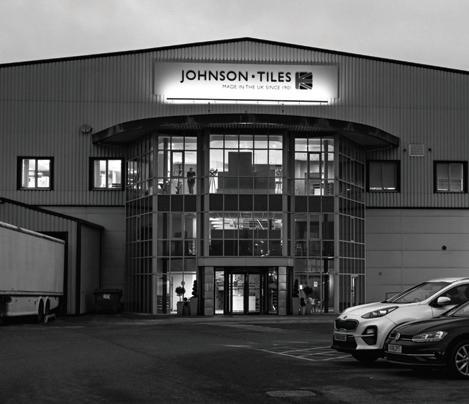
Steered by the UK in-house design team and building on its import business, Johnson Tiles will work alongside partners across the world.
According to the company, it will be able to design-match any UK manufactured products, to match ongoing project requirements.
Finnish eco-friendly bathroom manufacturer Woodio has invested €7million into a factory in Lahti, Finland, which will be completed in Spring 2025.
Founded in Helsinki in 2015, Woodio manufactures a waterproof wood composite, as an ecological alternative to ceramics and other high carbon footprint materials used in bathroom and interiors.
It offers two collections of washbasins, bath, and WC –Core and Made To Order – in the UK, which are made from the biomaterial.
Last year, the company raised over €16million in growth capital to scale up its operations and expand internationally and is
now transitioning from a pilot factory to a larger production capacity, enabled by the new factory in Lahti.
According to Woodio, the new factory will have greater automation, a “flexible” assembly line, use new techniques related to sustainability and the circular economy and will be seeking a “good level” BREEAM environmental certificate..
“We are really excited about our new factory. With this investment, we are seeking significant growth in our production capacity, enabling us to offer even larger projects and, in the future, contract manufacturing,” said CEO of Woodio Terja Koskenoja.
According to the company, the construction industry accounts for an estimated 40% of annual global carbon emissions.
Woodio reports carbon emissions of its raw material and energy-efficient manufacturing process, are “significantly” lower than those of traditional ceramic sanitaryware.
Matti Lentipuu, member of Woodio’s board of directors and managing partner of UB FIGG, the main shareholder of the company, said: “Woodio is an excellent example of high valueadded innovations in the forestry sector that Finland should invest in.
“In light of the industry’s emission figures, it is clear that

the demand for green construction will increase significantly in the near future. Woodio has every opportunity to establish itself as a pioneer in sustainable housing solutions.”
Woodio bathroom furniture is seeking international growth, developing its business in residential construction, enabling larger sales volumes, as well as in furnishing public spaces and contract manufacturing.
The Bathroom Manufacturers Association (BMA) has named architect and interior designer Oliver Heath as keynote speaker at its 2024 Industry Conference. He will be joined by Mohammed Chaudhri, chief economist and director of market intelligence at Experian, as keynote economic speaker. Themed as ‘Building Growth’, the BMA Industry Conference will take place on September 16-17, at the Queens Hotel in Leeds. See more details at www.rdr.link/KAZ001
Kitchen and bathroom suppliers have been recognised with a King’s Award for Enterprise, which celebrates the success of UK businesses. Triton Showers has been honoured with a King’s Award for Enterprise in recognition of its commitment to sustainable development, Whereas DeVOL was honoured with a King’s Award for Enterprise for International Trade. Read more at www.rdr.link/KAZ002
Home improvement chain Wickes has reported growth of lower-priced flatpack kitchens, despite subdued sales of bigger ticket items and Design & Install dip. In its latest trading results, Wickes stated the start of 2024 had seen a continuation of trends from the fourth quarter last year and its full year results, with volume growth in Retail but a decline in Design & Installation. Find out more at www.rdr.link/KAZ003
Led by third generation of family
Former finance & commercial director of kitchen distributor Waterline Michael Marriott has now been promoted to CEO.
Third generation of the family, he follows in the footsteps of his grandfather who founded a manufacturing business in 1946, making children’s toys, before the business transitioned to become a kitchen supplier – Crown Imperial – in 1980.
The Crown Group acquired the distribution business Waterline in 2011.
Prior to joining the family business, Marriott spent four years in Hong Kong, working for multi-billion-pound conglomerate Jardine Matheson and tasked with
modernisation of companies.
He has worked within Waterline for the last three years, joining as finance & commercial manager before becoming finance & commercial director.
Marriott has been involved in implementing its after-sales team and process, as well as product development direction and marketing.
Having recently rebranded with a revised logo, Waterline has also partnered with the Kbsa to support its independent retail members with discounts and credit terms.
Commenting on his promotion, Michael Marriott said: “My move from my current role
Sponsor announced and online bookings open

as finance & commercial director to CEO reflects the Waterline journey, as we modernise the business and move with the times, without detracting from the strength of being a family-owned business which is robust financially, nimble in product development and recognises the importance of customer service.”
Manufacturer and supplier of furniture fixture and fittings for the KBB industry Häfele UK has joined trade association the Kbsa as a corporate member and sponsor of its conference and awards.
It will be the Gold sponsor of the Kbsa conference, and Designer Awards hosted by comedian Ronnie Ancona, both of which take place at The Belfy in the West Midlands on October 9.
According to Häfele, it has joined the Kbsa “to consolidate its position” as a supplier of kitchen products – including lighting, appliances and internal

storage – to the association’s network of KBB retailers. Chief sales officer at Häfele UK Gareth Bevan said: “The Kbsa is an excellent example of how industry bodies connect with the market and help set the standard for kitchen design and creation.
“Our membership will enable us to work closely with retailers across the sector to help inform and inspire their designs with our wealth of products, while our Gold Sponsorship of the conference and the awards shows our commitment to the partnership.
The Kbsa has announced online bookings for its KBB Industry Conference are now live and chair Richard Hibbert said he was “delighted” with the response so far.
Hibbert concluded: “We hope to attract even more retailers than last year for what will be a must attend event.”
Appointments and promotions across the industry


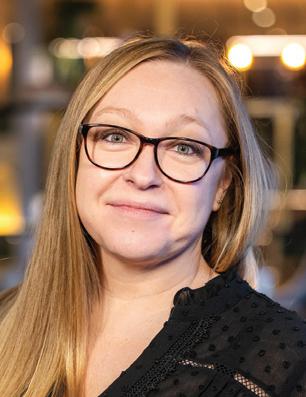
Surfaces distributor IDS has appointed three executives to its leadership team. Tariq Ahmad joins IDS as sales director, bringing over 30 years of sales experience in the construction industry, while Chris Coxon has been appointed marketing and commercial director. Completing the trio, Stefanie Wright has been welcomed as finance director.
Bathroom furniture manufacturer Utopia has appointed Gary Matthews as sales director. He over 30 years’ experience in the industry, having held senior roles with brands such as Grohe, Ideal Standard and, more recently, Duravit where he was sales director. Matthews will head up the sales team, build on existing relationships and forge new business.


Kitchen and bathroom lighting manufacturer Sensio has appointed Richard Bellwood as sales director.
With nearly three decades experience in the industry, Bellwood joins the company from PWS Distributors where he was national sales manager. At Sensio, he will be responsible for the sales strategy.
British manufacturer LochAnna Kitchens has welcomed Graham Jones as head of sales, to oversee and direct the brand’s sales strategy. With over 30 years’ experience, Jones brings a wealth of knowledge to the role, having worked with Sigma 3 Kitchens, Smallbone and Mereway Group. Jones will help build on the dealer network.




Toby Griffin looks at why sales conversions can vary – wildly – in the industry and suggests a way of clear measurement for retailers
There is an old adage when applying for jobs that qualifications and experience can get you an interview; but it’s up to you to get the job. Similarly, when it comes to generating sales, if your marketing is strong your business will be drawing in enquiries; but it’s up to the salesperson to convert those enquiries into money. But how do we know what is a realistic conversion rate, or even a preferable one?
Well, in my experience a lead-to-conversion rate of around 33% is about average in the KBB industry, with 50% for the top sales performers. But I have heard numbers as low as 10% and as high as 98%! It seems to me there are three main factors that can explain this huge variation:
1)Your price compared to your competitors (if you are seeking lower margins, you should be converting more)
2)The skills and talent of the salesperson
3)How the conversion rate is calculated.

And of all three, the last is the most easy to manipulate. Why, you may ask? It’s because it’s a matter of opinion as to what qualifies as a ‘lead’. Does a person walking into the showroom looking for a part for a tap qualify as a lead? Does a person who’s thinking of renovating ‘...in the next few years…’ qualify? Does a like or a comment on a social-media post qualify? It’s all a bit of a minefield in KBB retail.
Monitoring leads is a vital part of both seeing if your marketing is working, and how well your sales team is performing; but who decides what counts as a lead? Generally, and not preferably, it’s the salesperson themself, as they have the initial contact. But this is a case of them ‘marking their own homework’, especially if they know that conversion rates are being scruitinised. I have known salespeople deliberately failing to register enquiries (or delay registering enquiries until they look like converting) in order to make their conversion rate look better.
So what to do about this? Well, I see two main ways to mitigate against this variation:
Does a person walking into the showroom looking for a part for a tap qualify as a lead? Does a person who’s thinking of renovating ‘...in the next few years…’ qualify? Does a like or a comment on a social-media post qualify? It’s all a bit of a minefield.
Clearly set out what qualifies as a ‘lead’ at your company, and communicate this in writing to your salespeople. A good way of doing so is by having an enquiry form, which the salesperson can complete with the new client, which prompts questions to be asked about budgets, expectations, times-scales, etc. Having passed the test, as such, they are then registered as a lead, and it’s up to the salesperson to make it into a sale.
If you have more than one salesperson, compare their conversion rates in the same way as you would do their sales (but be wary that some canny sales people have a habit of grabbing the promising leads, and leaving the rest to their colleagues!). Even with individual salespeople you could monitor their conversion rate over time to see the effects of the changes you are making to the marketing; and it’s also a chance to see if they need some help from you, or a big pat on the back!
But, it’s worth remembering that in most cases, salespeople with low conversion rates will often blame factors out of their control; for example pricing, product/service availability, but rarely want to consider their own input as being the deciding factor. Equally, be aware that the over-performing sales converter might just be manipulating the system.
Terry Griffin will be speaking at Kitchen of the Future Theatre during the InstallerSHOW on June 26.

We ask a panel of directors at Hill’s Panel Products (HPP) what is impacting the KBB industry and how they are mitigating these challenges, to find out what retailers can learn from their experience
Interest rates, energy prices, difficulties recruiting, and general economic uncertainty created by the growing number of conflicts around the world are impacting the KBB industry. These are the views of four directors at board, doors, fittings and accessories supplier to the fitted furniture industry Hill’s Panel Products. Managing director Keith Wardrope, deputy managing director Gareth Evans, purchasing director Alan Bolton and marketing and business development director Dan Mounsey, spoke about combating an uncertain market. We find out how the company is navigating and mitigating changes, and discover how their experiences can relate to KBB retailers.
“How do you combat uncertainty? By staying positive,” says MD Keith Wardrope. “2023 started with a certain amount of optimism but the market softened as the year went on, particularly in the last three months. Costs
increased significantly, and interest rates were starting to bite. I hope the market at least stays stagnant in 2024, although there are some signs it’s slipping again. I’d like to see prices start to change to some sort of normality again, especially in certain product categories such as maintenance and tooling costs. They’re the areas that have really shot up that nobody really sees. But in these circumstances, you need to concentrate on what you can influence, what you can do to keep the business thriving. There’s always work out there, it’s how long and how hard you have to work to get it.”
Pointing out how HPP has developed its business, deputy managing director Gareth Evans says: “We have to be the best we can to give people less reason to do business elsewhere. The service that we offer, and the range of products has to be as good as it can be. We’re looking at new products all the time and we’re being as competitive as we can on price. We’re always trying to push forward, and we’ll continue to do that.”
1. DIRECTOR BOARD
Deputy MD Gareth Evans, MD Keith Wardrope, marketing and business development director Dan Mounsey and purchasing director Alan Bolton
The need to focus on competitive pricing, has been exacerbated by high interest rates. Keith Wardrope comments” “I’d be interested to know how many kitchens in the UK are bought on finance. I believe people have really pulled away from buying like this because there’s a massive difference between paying 2% and 3% interest to having to pay something approaching double figures.”
Although interest rates have fallen, they are still above the Bank of England target of 2%, at the time of going to press. Alan Bolton commented: “Interest rates are definitely stifling the market and if they stay where they are nothing is going to change. When interest rates started biting, I think businesses thought they could ride it out for a while, but
as it got progressively worse, that’s when the market started to soften. But as the older members of the team know, these things go in cycles, so this is a blip that could change with it being an election year.”
The KBB industry has also been impacted by greater costs, from energy prices through to maintenance. Energy price rises were starting to slow, but worldwide unrest could send prices soaring again, while organisations emerging from long term arrangements could feel the pinch as the price gap between old and new tariffs take effect. Marketing and business development director Dan Mounsey comments: “We’ve been very diligent about how we’ve purchased our energy, and our proactive approach with a fixed arrangement has worked very well over the last couple of years when prices have been increasing. But the arrangement’s coming to an end soon, so we have to decide what we do next. I think there are going to be a lot of businesses in that position who are not as robust as we are, and they could find the situation difficult. Do
they fix again – which probably isn’t the best option at the moment – or opt for day-to-day or month-to-month prices? Following the market rate looks a good option for now but another conflict in the world could send prices soaring again. It all depends on your attitude to risk.”
Like many KBB businesses, HPP has also been confronted by the changing jobs market. Mounsey says: “From a recruitment point of view, it’s been very challenging for certain jobs. There’s been a big shift in the relationship between employers and employees. The sort of workplaces that are quite common now, you could never have imagined 20 years ago – with hybrid working and flat structures. There isn’t as much ‘the boss is the boss’ culture any more. You have to do more to attract staff these days. We haven’t recruited in a little while, but I think there’s probably more people being let go than being recruited at the moment, so that might change the dynamic in the future.” However, he added: “We’ve done really well
You need to concentrate on what you can influence, what you can do to keep the business thriving. There’s always work out there, it’s how long and how hard you have to work to get it.
at retaining staff, so hopefully we’ve done a lot right through communicating regularly with staff and creating the right work balance.”
While all four directors agreed the industry had come to terms with the Russia-Ukraine conflict, and the west had ‘weaned’ itself off Russian gas, future conflicts could impact the economy – and therefore markets – in many ways. Alan Bolton explains: “If you’d told members of the public that Russia invading Ukraine would put up the price of their new kitchen by 25% in three months, they would never have believed you. That’s the type of scenario you could be looking at again if Europe has to face up to more conflicts.”
Keith Wardrope agrees, explaining it could be an area of trepidation for the KBB industry. “If conflicts keep happening around the world, then that is a reason for concern. The impact (of conflict) is bigger than many people appreciate. Costs will go up again and the markets will dip. It’s all on a knife edge that could go the wrong way in the wrong circumstances.” However, he concludes: “You have to question how long the RussiaUkraine war will last? If it was to end that would create a whole lot of positivity that would be welcome in all walks of life.”
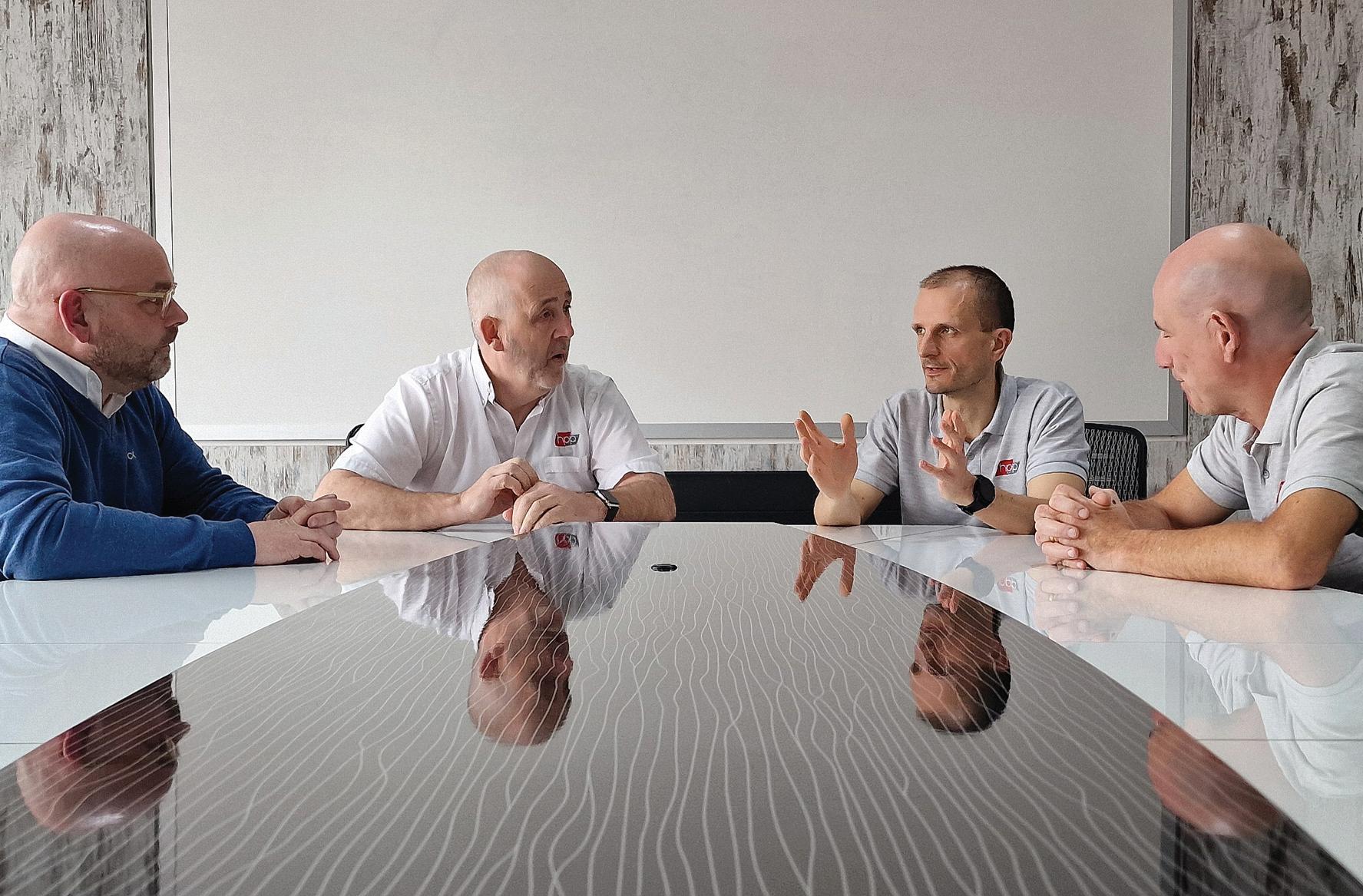
Co-founder of Callerton James Herriot has published a book –Insights to Kitchen Design –using over 40 years of experience in the industry. So we ask how kitchen projects have evolved, common mistakes made by designers, and what the future holds for design training

QHaving founded Callerton 40 years’ ago, how have you seen the practise of designing kitchens develop in that time?
A: The practise of designing kitchens has altered dramatically over the past 40+ years. When I entered the industry it was a much simpler role compared to today. We worked with a tape measure, scale rule, drawing board and pencil. Much of our work (at that time) related to replacement within an existing kitchen, or supplying kitchens to developers with very little scope to alter the dimensions of a room. It was the total opposite of today, where the vast majority of projects involve changing layouts, opening-up rooms, building extensions, etc. It’s a much more sophisticated environment today, where the kitchen is the central hub of most homes.
The skill, knowledge and ability required to excel in today’s world of the kitchen specialist is vast compared to 40+ years ago, and requires designers to continually expand their knowledge and understanding due to the developing nature of our industry.
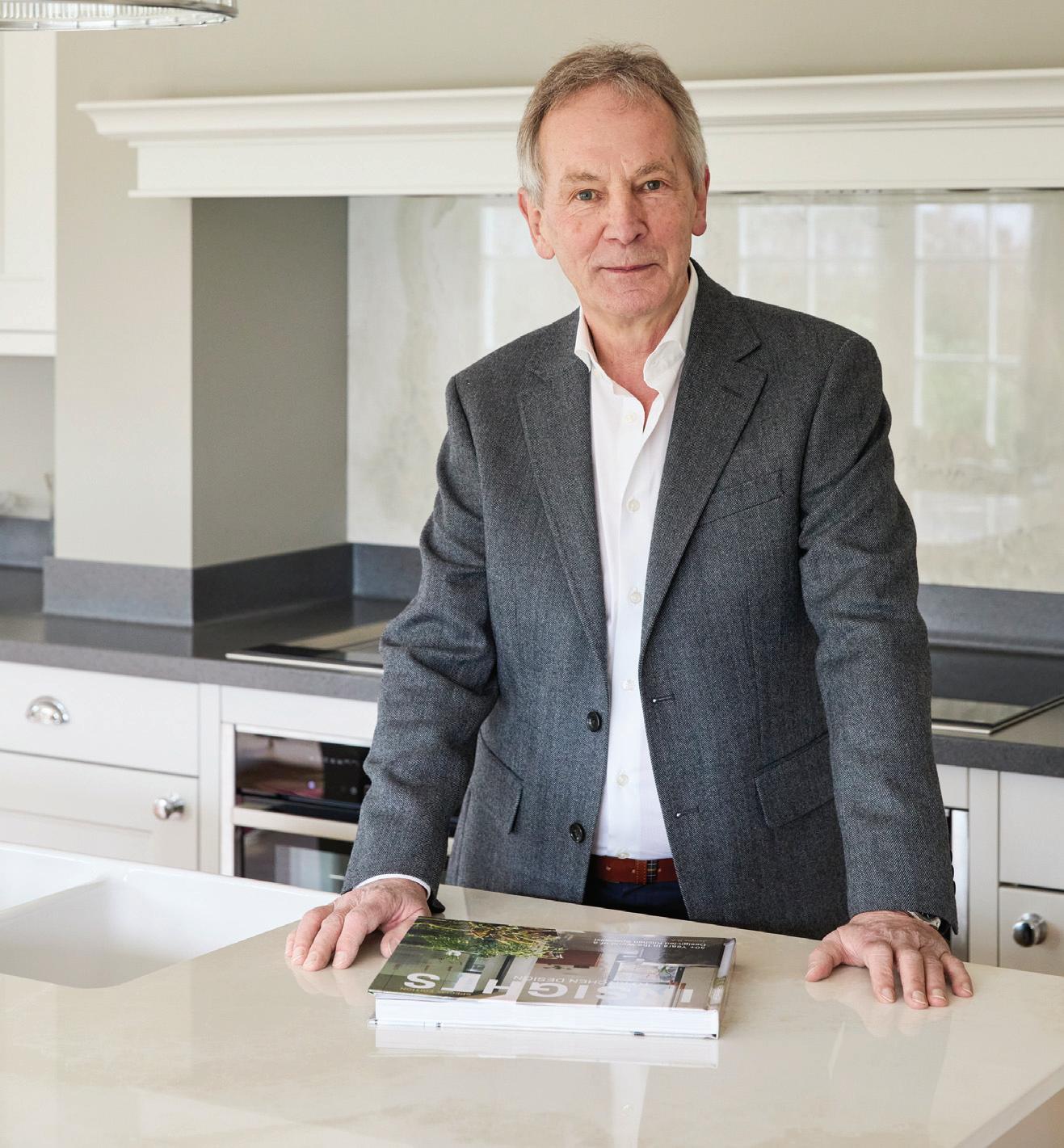
I believe the kitchen specialist changes the way clients live and operate within their homes. This may sound dramatic but it’s exactly the point I set out to make within my book ‘Insights to Kitchen Design’.
QWhat has surprised you the most about the evolution of kitchen design during this time?
A: It relates to Callerton’s tag line ‘Turning Dreams to Reality’. The ability to fulfil a client’s dream has grown exponentially over 40+ years. We are engaged in an ever developing fashion industry – an aspect of our industry I love. Possibly an element that surprises me, is the pace of change.
QYou published the first Kitchen Inspiration magazine 10 years ago. Who was it for and why was it needed?
A: Kitchen Inspiration’s aim has always been to promote the three vital elements of a successful kitchen project: Great design, great products and great project management. These are the
1. 40 YEARS OF DESIGN EXPERIENCE
Utilising four decades of kitchen design experience, James Herriot has published a book
2. FOUNDER AND AUTHOR
James Herriot is founder of Callerton and author of Insights to Kitchen Design
raison d’etre of the design-led kitchen specialist. The intention of Kitchen Inspiration is to educate the end client what’s involved in a successful kitchen project and why they should engage with a kitchen specialist.
QMost recently, you published your own book Insights to Kitchen Design - featuring case studies of previous work revisited. Can you explain why you decided to write the publication, who is your audience and why is now the right time?
A: Having produced an on-line journal during the second COVID-19 Lockdown for friends and family, ‘The Sabbatical’, it was picked-up by Extremis Publishing who published it in

book form. I got the writing bug and thought I would pass on a little of what I have learnt over 40+ years in the kitchen industry. My aim was to celebrate the skills of the kitchen specialist, show how to achieve the results, and (hopefully) inspire recruits to our industry.
QWhy did you choose the 20 case studies in the book and how difficult was it to select them?
A: The first 10 were all projects in which I had personal involvement, while the next 10 projects are the work of Callerton designers to explore how they went about creating a project. Possibly the hardest aspect of producing the book were the two alternative designs created using the same footprint from each of the 20 kitchen case studies. For these, I have to thank my colleagues at Callerton head office.
Q What has been the industry reaction to your book? Is it what you expected?
A: It is very early days, but the response has been extremely positive. I am not expecting to make the best seller list but I’ve enjoyed the challenge.
QWhat do you think of the quality of kitchen design and designers now?
A: I believe we have many amazingly, talented designers and the quality of design in the kitchen specialist sector is first class. I am lucky enough to engage with many such individuals.
QWhat are the biggest mistakes you’ve noted kitchen designers make and how would you suggest they overcome them?
A: There is no individual mistake I can identify. Ours is a complex industry and the importance of ‘Right 1st Time’ benefits all parties: End client, retailer and manufacturer. My one suggestion to overcoming mistakes is to engage with training and ensure these mistakes don’t happen twice.
QHow disappointed were you the Kitchen Design Degree folded? What do you believe should be the next step?
A: The demise of the Kitchen Design Degree was a sad moment and a loss to the industry. I have watched several of those who qualified achieve amazing results. Two were young designers when I first encountered them and both are now directors of the Callerton dealerships who first employed them. Amazing!
I am a great believer our industry would benefit from a co-ordinated education programme. I don’t profess to have the answers but could manufacturers who run product training programmes combine with others?
Callerton has created its own training programme for retailers, which by chance happens to incorporate elements of the 20 kitchen case-studies and 40 alternative CAD designs from my book ‘Insights to Kitchen Design’. Currently, we are working in conjunction with Blum, Cyncly/Compusoft,
I believe the kitchen specialist changes the way clients live and operate within their homes. This may sound dramatic but it’s exactly the point I set out to make within my book ‘Insights to Kitchen Design’.
3. ALTERNATIVE VIEW
Showcasing real kitchen case studies and offering alternative design suggestions for the projects
4. INSIGHTS TO KITCHEN DESIGN
Insights to Kitchen Design shows how to achieve the projects, and (hopefully) inspire recruits to the industry.

as well as Sensio, amalgamating aspects of each company’s training programme.
QWith the advent of AI, how do you see the role of the kitchen designer developing in the future?
A: As someone who began my working life 50+ years ago – the benefits of technology in our business has been immense. My thoughts are AI will only add to this. It won’t replace humans, but will enable us to be more efficient and effective.
Watch the video and buy the book at www.rdr.link/KAZ004
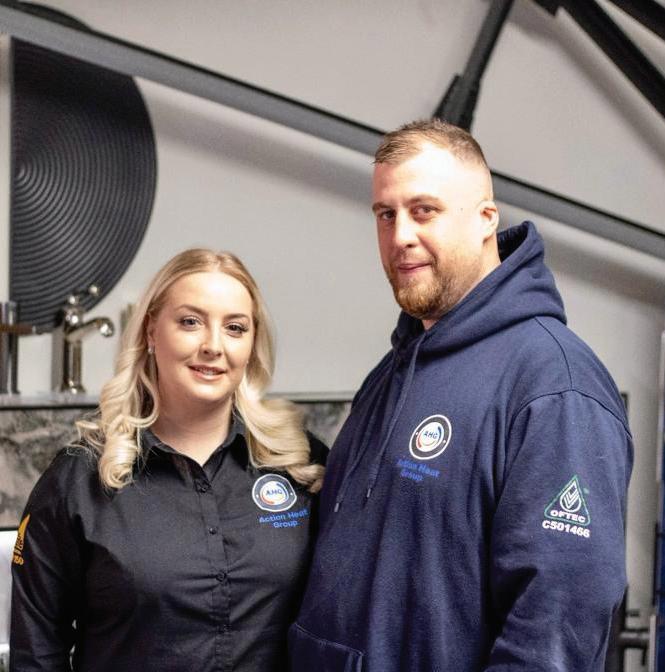
Owners of Staffordshire-based plumbing firm Beth Colley and Andy Galletely explain the journey to open a studio –Action Bathrooms –and the role VR CAD played in that decision
When owners of Staffordshire-based plumbing and heating company Action Heat –Beth Colley and Andy Galletely – noticed a growth in fitted bathroom projects, they decided to open a luxury design studio. Celebrating its first year of trading, Beth explains why they started with creating a separate brand for the retail business - Action Bathrooms – based in Blythe Bridge, Stoke-onTrent. “We felt that, because of the calibre of bathrooms we were designing, supplying and fitting, it needed its own identity but still in keeping with Action Heat Group”, says Beth. Andy adds: “We wanted consumers to immediately understand we design mid-tohigh-end bathrooms.”
Having made the decision to acquire a showroom, Beth explains the whole process was rapid: “We looked at premises the next day, and by the end of the week we had the keys. It has been very fast paced.” They chose the location, as Andy grew up there, and it is well positioned to serve neighbouring rural areas with oil and LPG sales through Action Heat, while offering an affluent client base –in a 30mile radius - for Action Bathrooms.
Sited above a row of shops, the space used
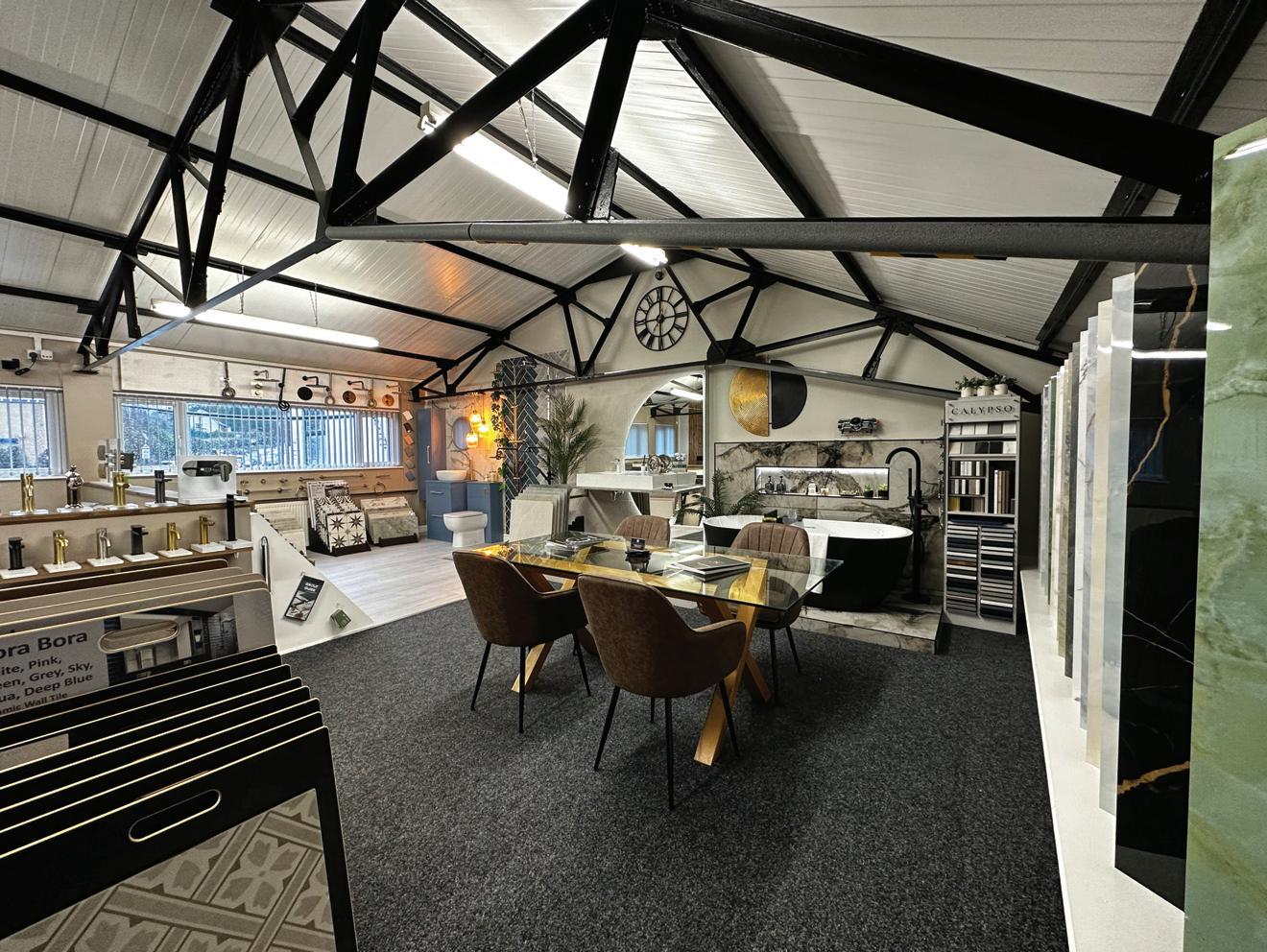
1. COMPANY FOUNDERS
Beth Colley and Andy Galletely have opened Action Bathrooms in Stoke-on-Trent
to be a dance studio with bright pink walls. Now it has been transformed into an industrial-style bathroom space complete with bar and 4D CAD Theatre. “The hardest part of the design was making each section stand out but flow around the space”, says Beth, until she muses: “We were up until 2:00am painting the beams. We were going to put in a false ceiling but then thought we could make a feature out of them”.
Of course, as with all the best laid plans, there were unaccounted for issues during the move. “We were held up because the roof was leaking and due to heavy snow in December last year, we had to wait for it to be fixed before we could fit it out”, says Beth. While Andy explains the transfer to new premises cost more than the original budget. Its telecommunications provider lost the company phone number requiring new signwriting for vans and premises and new uniform logos. as well as additional expenses to achieve their desired standard in the studio space. “We probably spent 50% more to get it to the standard we wanted”, says Andy.
The focus on quality is reflected in the choice of suppliers and the value of its projects, as Andy
2. DANCE TO DESIGN STUDIO
Situated above a row of shops, the second floor dance studio was transformed into a luxury bathroom space
explains: “Most bathrooms start from £10,000 upwards for a full remodel”. He says for each refit, they go back to brick and renew all the pipework, and Andy highlights the choice of premium brands offered by Action Bathrooms.
Among its suppliers, it numbers House of Piccadilly, Aqualisa, Elisa, Thomas Crapper, Calypso, Armera and Ashton & Bentley baths “one is installed in Tyson Fury’s house”, says Andy. They also point to reps as being useful to introduce brands to the business, such as Bubblespa and TED (thirty-eight degrees): “Without having that relationship with our reps we wouldn’t know about these new products”, adds Beth.
Choosing brands not only on the product design and ability to colour match across brassware ranges - “as it’s those details that make the difference,” explains Beth - they have selected suppliers who offer 10-30 years’ warranties. “We want them to match the level of service we offer at Action Bathrooms”, Beth adds.
The customer service starts with a design consultation in the appointment-only studio, with Beth creating a styleboard before offering a 4D CAD by Virtual Worlds
experience. “We’d seen Virtual Reality (VR) on TV programmes “Your Home Made Perfect” and “Grand Designs” and thought it offers consumers something different”, says Beth. Action Bathrooms reports it is the only business offering VR in a 40-mile radius, “but we think it will become standard”, Beth adds.
They explain VR allows consumers to experience their bathroom prior to purchase, ensuring the design meets their needs –functionally and aesthetically - and says it helps seal the deal. “You wouldn’t buy a car without test driving it. So we can show you the bathroom before you’re had anything done. We’ve eliminated any risk”, says Andy.
It is just one example of how the business thinks differently to local competitors, as alongside 4D CAD, Action Bathrooms offers out-of-hours appointments. “We’re a familyrun business and we understand that family life isn’t always 9-5, Monday to Friday. So we will, quite often, do after work or weekend appointments, to fit around people”, explains Beth. “We feel that allows people to choose their bathroom in a relaxed environment.”
The same level of service is carried throughout the project, making sure the
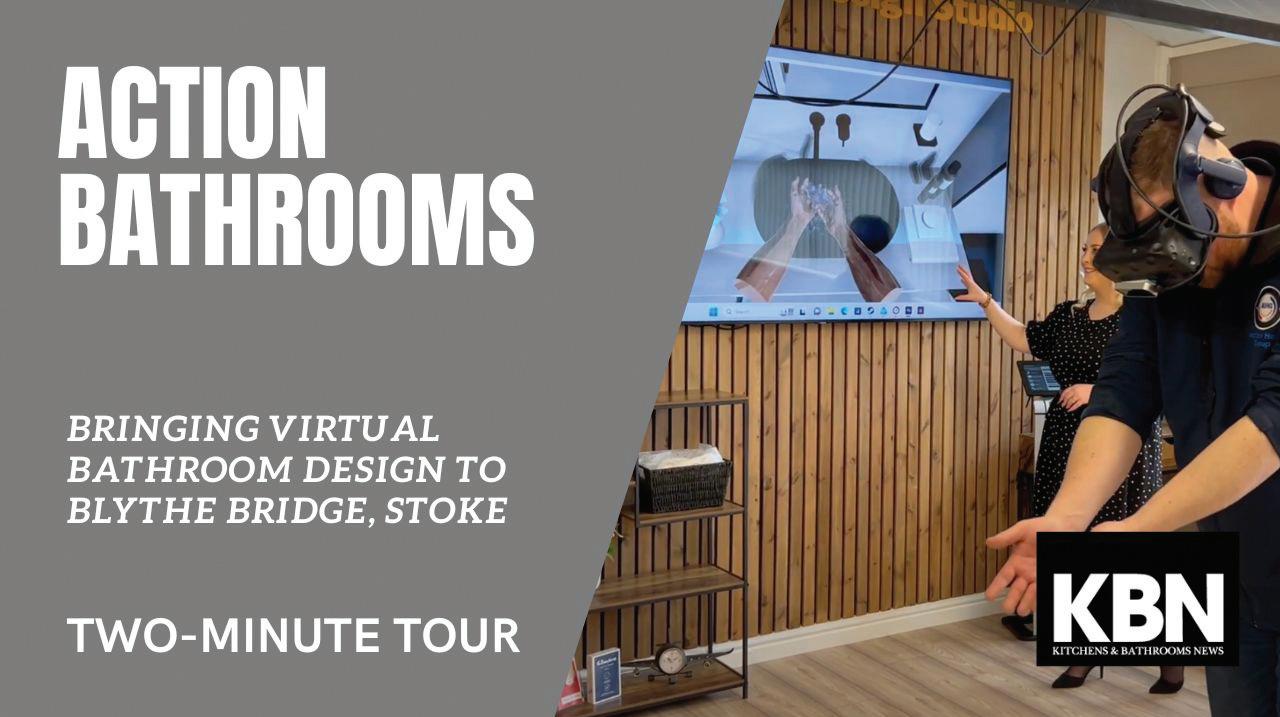
installation is tidied each night, and Beth will personally inspect the bathroom before sign off. When the process is complete Action Bathrooms presents the customers with a gift from the team. “People compare us to companies in London because we like to give that level of service. It’s a personal touch at the end of the job”, Andy explains. So has there been a business that has inspired them to offer this level of service? “I don’t think we saw anyone with that model and thought
that’s what we want to do. We saw people not doing that and thought that’s what we would like to do”, says Beth.
Stating customer reviews offer them both the greatest satisfaction, Beth highlights one of the latest comments was they were “professional miracle makers”. However, Action Bathrooms are keen to continually improve, as Beth concludes: “We’ll always develop the business. We’re not planning to stay still.”
Whether it is specifying for a large project or a domestic refurbishment, safety in bathroom design is always a concern. Invisible Grip is the latest anti slip surface from Kaldewei. It has been designed to provide the highest standard for standing safety in the bathtub or under the shower. The micro-structuring of the enamel is completely invisible and provides a particularly strong grip event when using soap, shower gel or shampoo. In fact the grip comes into play any time there is contact with water.
With this new product Kaldewei provides a pioneering innovation for designing safe bathrooms for all generations. It has been thoroughly tested for its impressive anti slip properties. In fact, LGA Bautechnik has confirmed the anti-slip properties of
Invisible Grip according to quality class C for wet barefoot areas according to DIN EN 16165. This is particularly relevant when planning of barrier-free bathrooms.
Invisible Grip is true to its description, being both invisible and providing excellent grip, with the added advantage of feeling pleasant underfoot. It is available in Alpine White and can be used for both shower areas and for bathtubs. In dry condition the Invisible Grip surface does not diminish the gloss and splendid shine of the Kaldewei steel enamel surface, which means that Invisible Grip provides safety, and brings a touch of modern glamour to the bathroom.
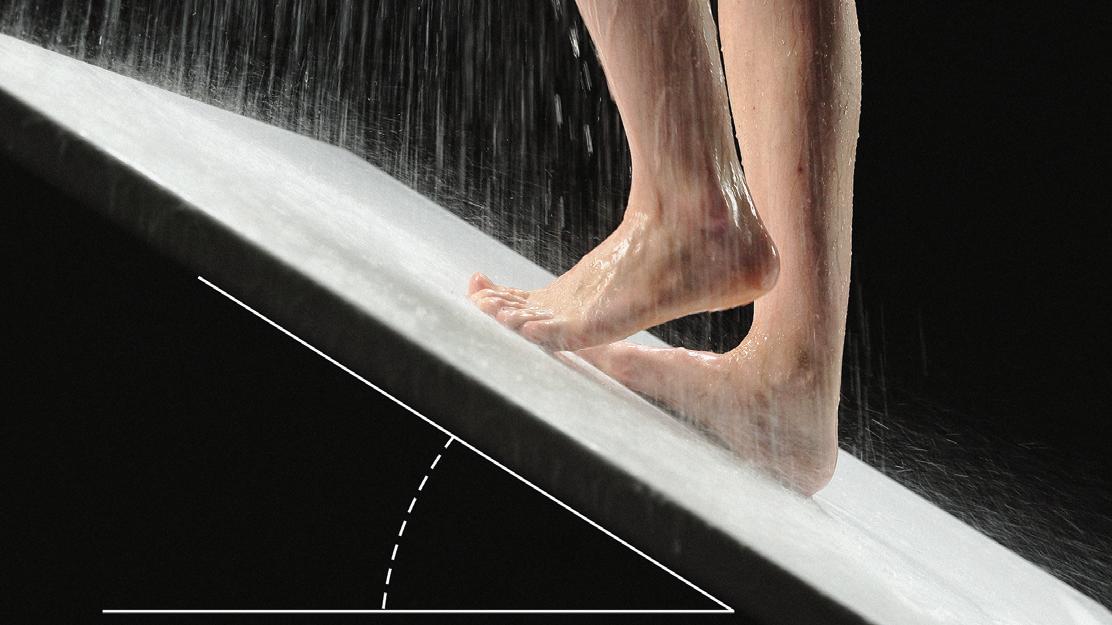
Its micro-structure can be cleaned as easily as a regular steel enamel surface, plus it can be applied to all the Kaldewei steel enamel
bathtubs and shower trays which makes it perfect for multigenerational applications too. Like every product of the Luxstainability®World from Kaldewei, Invisible Grip stands for uncompromising safety and trust combined with a highly aesthetic surface finish. www.kaldewei.co.uk
3. IRTUAL REALITY DESIGNHansgrohe has recently opened a new HQ in Warwick as part of a £5million investment. We discover how it supports retailers with improved accessibility to its Water Studio showroom, enhanced stock, and installer training under one roof
Five years in the making, and despite the challenges of Brexit and COVID, Hansgrohe Group has opened its new UK headquarters in Warwick. Part of a £5million investment, the 40,000sqft headquarters is double the size of Hansgrohe’s previous UK HQ in Surrey and offers product showrooms, customer services, installer training and stock distribution all under one roof. Created to improve accessibility and offer increased stockholding for its broader product portfolio, the purpose-built premises was officially opened by Hansgrohe Group CEO Hans Juergen Kalmbach and managing director for Hansgrohe UK & Ireland Jay Phillips.
Speaking at the opening, Jay Phillips comments on the decision for a larger HQ, which was partly driven by the company’s expansion into new product areas: “We saw potential to grow the business significantly. We had visibility of what was coming down the track and the expansion of our portfolio, moving into new categories with the launch of ceramics, bathroom furniture and mirrors

giving us great potential in terms of addressable markets.”
As part of this, the company wanted to showcase its broader product portfolio in an inspirational environment, motivated by its existing Water Studio in Clerkenwell, London, created for the architectural community. “We wanted to replicate something on a much bigger scale with our head office”, says Phillips and to enable ease of access for all its customers around the UK, Hansgrohe chose Warwick, in the Midlands, as a central location.
The premises includes 4,000sqft of showroom space, with new Warwick Water Studio, featuring its Axor and Hansgrohe portfolio, complete with working displays. And this is joined by the Installer Academy training centre for hands-on experience.
Although Hansgrohe first looked for
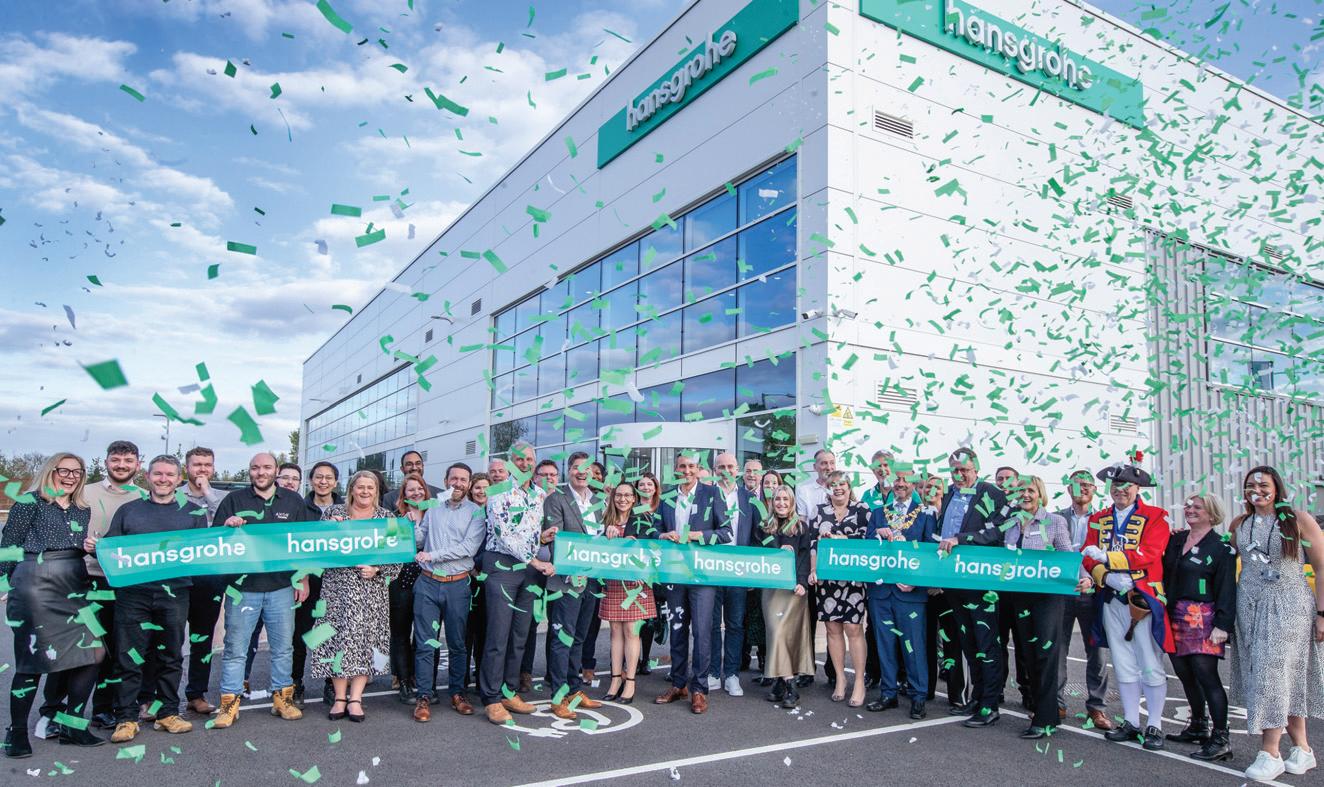
1. OFFICIAL UK HQ OPENING Hansgrohe Group CEO Hans Juergen Kalmbach and MD for Hansgrohe UK & Ireland Jay Phillips.
2. LARGER AND MORE ACCESSIBLE
Measuring 40,000sqft, the purpose-built headquarters is based in Warwick
existing premises, with such specific requirements, the company opted to build its own HQ. It is split 70:30, with warehousing taking the majority of the space, and head office, Installer Academy and showroom the remainder. Although the UK is already in the top five performing countries for Hansgrohe, according to chief sales director Christophe Gourlan, Jay Phillips said: “We have got a great platform for the growth of the business.”
Hansgrohe is looking to grow its share not only in showering but also the bathroom market. Having acquired bathroom drain specialist Easy Sanitary Solutions in 2020 and launched ceramics, furniture and mirrors into Europe at ISH in 2023, it has become a bathroom generalist rather than a brassware specialist. It’s not the first time Hansgrohe has expanded its core categories, adding sinks to kitchen mixers, but Jay Phillips says the bathroom expansion offers far more sales opportunities.
The one-stop shop, holistic bathroom concept, followed consumer research which found they already believed Hansgrohe offered furniture and ceramics. “So, for us, it was a very natural evolution”, says Phillips, “In
all honesty, we were probably a late entrant into the market, although what I would add, it’s a comprehensive range. We are up to 1,000 SKUs.” Targeting bricks and mortar showrooms, marketing director Julie McLean explains the holistic bathroom concept plays into the independent specialists’ skillset, especially as designers look to combine finishes and materials in bathrooms.
So, what has been the reaction from retailers? Jay Phillips explains: “It’s still quite early days because effectively we’ve only been supplying these new product categories into the market for less than six months.”
However, he adds: “The initial reaction from customers to our ranges has been exceptional. We’re ahead of where we expected to be, in terms of showroom partners, displays and POS. We also picked up some early project specifications with hotels and housebuilders which probably we weren’t planning for that to be until 2025 or 2026.” In fact, Phillips states it is 30% up on its expectations for new product category sales.
And Christophe Gourlan points to the further development of the Hansgrohe business, with the launch of a smart toilet in China in 2019, followed by furniture and ceramics two years’ later. In 2022, it introduced washbasins into the Middle East and 2023 saw the first complete bathroom offering in Europe in 2023, expanded to the volume segment in 2024. “We now talk about the wash place, the shower place and the toilet place”, says Gourlan. Although remaining tight lipped about plans for ISH 2025, it does give an indication of the direction of the company.
However, the expansion of the company across product sectors, opening new
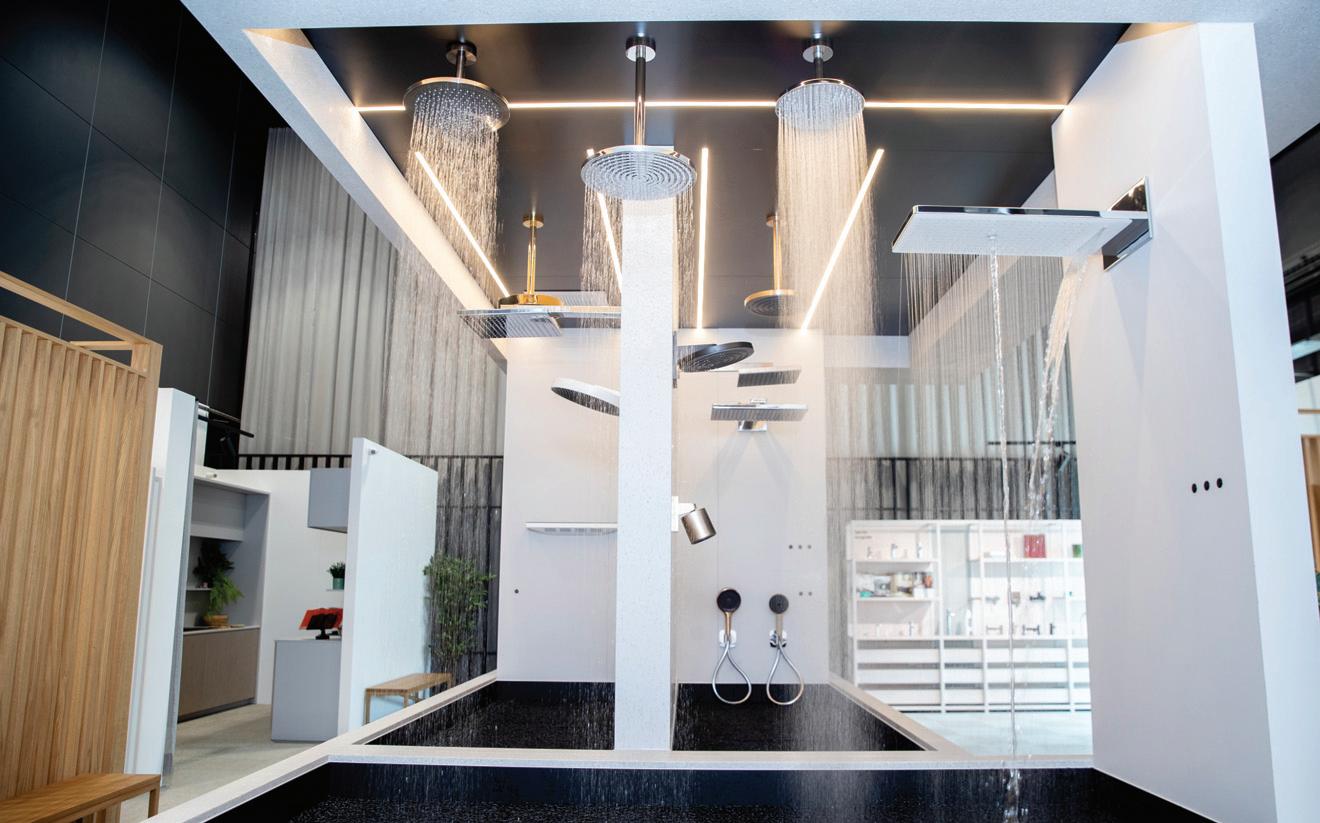
3. WATER STUDIO
With spaces for its Hansgrohe and Axor brands, the HQ features The Water Studio, a 4,000sqft showroom space
factories and UK HQ, has not been at the expense of the environment. CEO of Hansgrohe Hans Juergen Kalmbach says sustainability has long been part of the DNA of the business, as former leader of the business, Klaus Grohe stated in the 1990s: “Climate change is already a reality today. When it comes to minimising CO 2 emissions, all of society needs to get involved. We’re paving the way today for the day after tomorrow.”
And Hans Juergen Kalmbach explains how the company and its products continue to save water, reduce carbon emissions and improve circularity of resources. He points out at ISH 2023, Hansgrohe introduced its Green Vision to reduce water, heat use and therefore carbon emissions by 90% in the bathroom. “Since 2022, all our global locations are climate neutral by Scope 1 and 2”, added Kalmbach. Hansgrohe now also uses renewable energy from a wind farm in
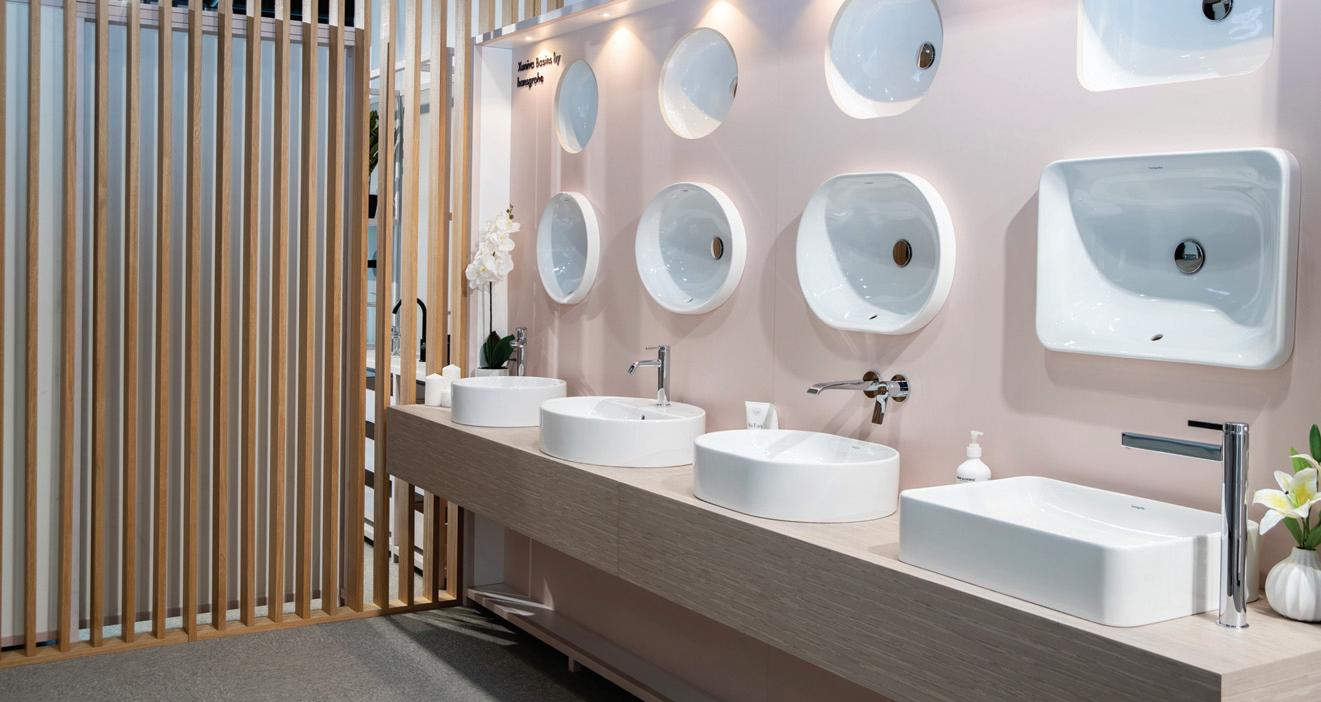
the Black Forest. Solar panels are set to be installed on the roof of the UK HQ to provide electricity for the business and excess energy will be sold back to the grid.
Despite a testing economic background and “parachute land” in 2023, following the sales spike of COVID, Jay Phillips says the company has been “satisfied” meeting budget expectations for the first quarter. “I think overall the market is still quite challenging. The macroeconomic indicators are quite positive with inflation at 3.2% and interest rates largely expected to be reduced across the summer, so I think that will breed more confidence into the market second half of the year and certainly into 2025.”
And Phillips believes the growth will be across its historic brassware business, as well as new product categories: “We have been growing share in showers and taps. The new categories, in terms of opening up the addressable market, gives us substantial incremental opportunities.” He outlines a goal to outperform the market in 2024, forecasting growth of 5-10%.
Although a prominent brand in the bathroom industry, Kalmbach states the company is far from complacent and uses football as an analogy of its competitive mindset: “We are always looking forward, exciting times are ahead of us. We need to stay ambitious and focus on where we need to improve if we want to stay ahead. We are one of the leading brands in our industry and we always want to win the Champions League.”

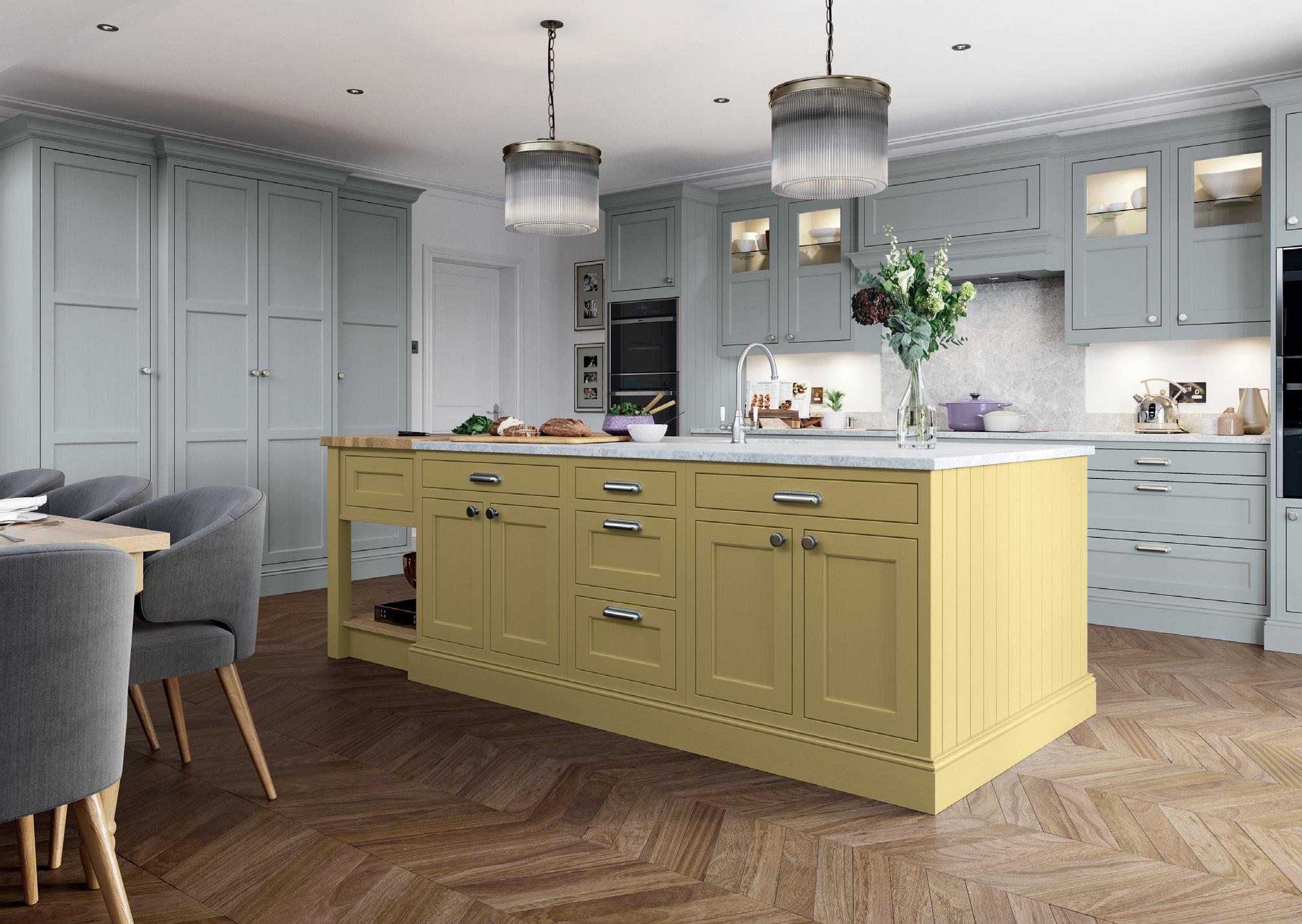
How the in-frame kitchen has evolved to become simpler to design and install and more cost-effective, appealing to a broader church of consumers
With a move towards timeless, quiet interiors, in-frame styles have increasingly found favour in kitchen projects. Offering classical, beaded doors through to transitional, contemporary Shakers, in-frame kitchens provide a variety of elevated living space looks. “With contemporary and classic kitchen styles continuing to merge, in-frame designs are a popular choice for a wide range of homes - from period properties and country cottages to Victorian houses and modern new-builds in need of character”, explains design manager at Symphony and Laura Ashley Josie Medved.
In fact, kitchen category manager at LochAnna Kitchens Sinead Trainor points out in-frame is the company’s most popular kitchen by value: “Out of 18 kitchen styles, across eight price groups, LochAnna
Kitchens’ Durham collection ranks as our fourth best-selling range by value and accounts for more than 15% of LochAnna Kitchens sold.” It is no surprise then, that inframe is influencing the furniture choices offered by manufacturers, as sales director of Getley UK John Sheehan points out: “We have had to increase from one in-frame door design to seven, to be able to cover all design aspects requested by the end consumer.”
Ultimately, the Shaker style is at the heart of in-frame kitchen sales, probably due to its versatility in satisfying a broad church of consumer tastes. Industry experts state the chameleon nature of the Shaker means it can be dressed with detailing or simplified to suit not only the kitchen space but throughout the home. Managing director of Daval Simon Bodsworth explains: “The beauty of this
1. GETLEY UK
Sunflower has been added across the Alku in-frame kitchen ranges, including Bergen. View the details at www.rdr.link/KAZ005
design is that it can be easily carried through the rest of the home in custom fitted furniture, including the utility room and home office, as homeowners are increasingly embracing a signature whole house style and retailers are keen to support these needs through supplying bespoke storage.”
Unsurprisingly, then, the in-frame commands a premium price tag, not only due to a largescale kitchen but, the in-frame is also more complex. The carcases are bespoke, requiring greater work when fitting, and retailers have to pay greater attention to internal storage, which is part taken up by the frame. It means
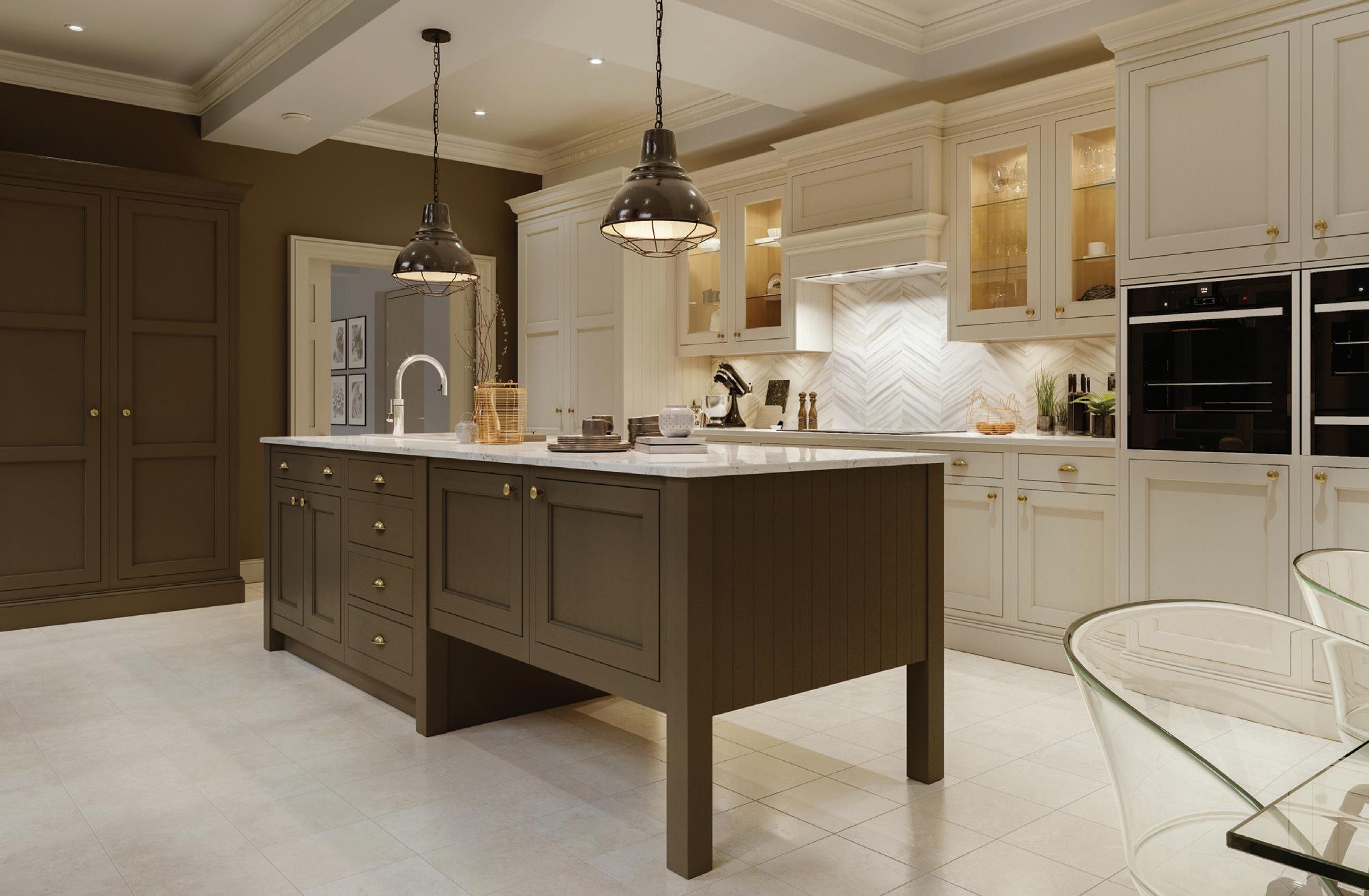
2. LOCHANNA KITCHENS
The true-in frame Durham is available in 30 colours and has beaded detailing on the inner door. See the entire palette at www.rdr.link/KAZ006
3. SYMPHONY
Part of the Laura Ashley Kitchen Collection is Helmsley, which is available in a choice of painted finishes. View the brochure at www.rdr.link/KAZ007
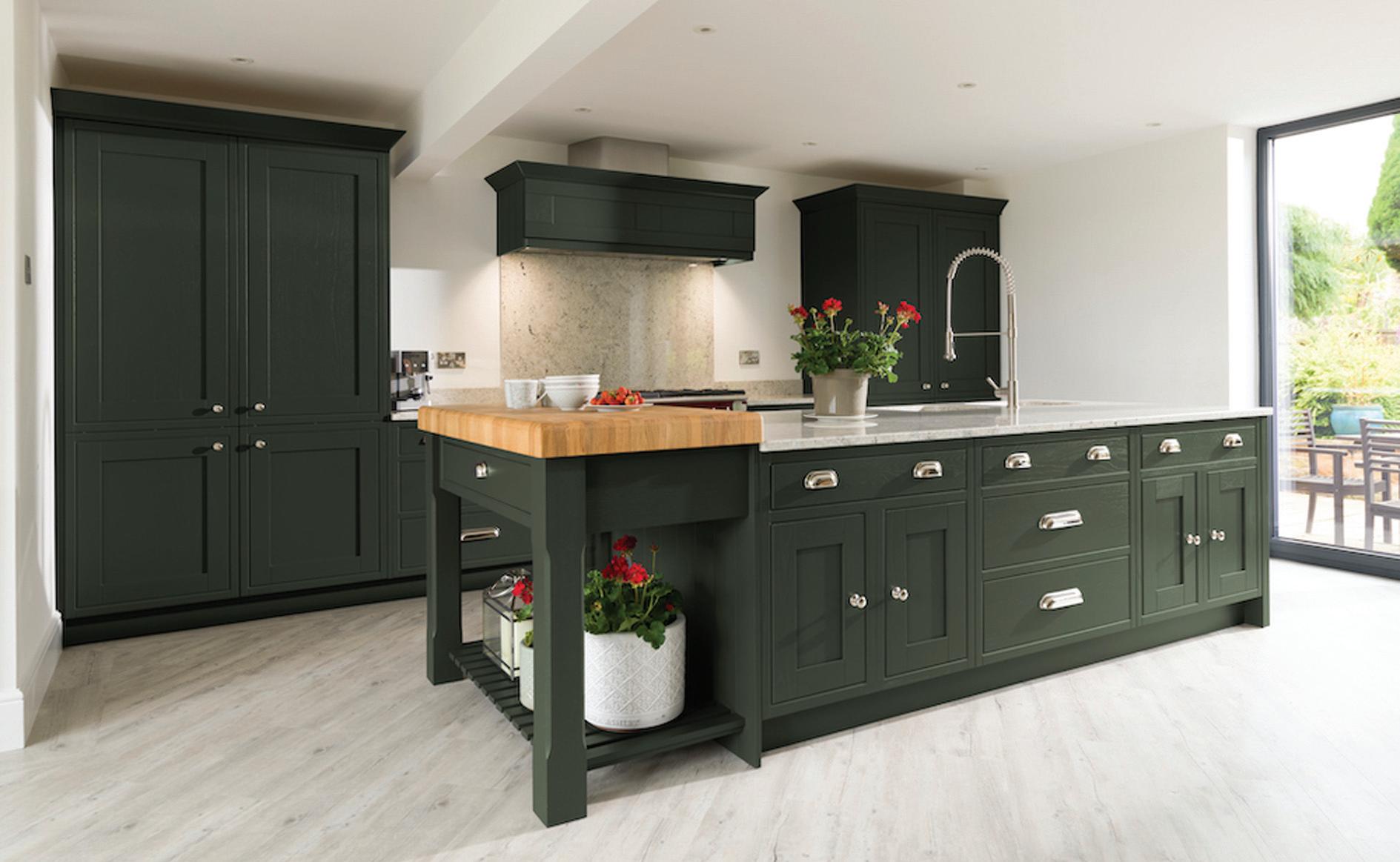
suppliers have to support retailers on the considerations for in-frame furniture and provide internal storage solutions specially adapted for in-frame kitchens, to minimise design and specification errors.
Getley UK offers one-to-one in-house training, with a full list of all CAD drawings including unit sizes, hinge and feet locations,
provided as part of customer order confirmation. John Sheehan of Getley UK adds: “A lot of retailers shy away from inframe kitchen saying they are unfamiliar with the products, but with our help and training it’s no more complicated than standard kitchen designs.”
Further helping retailers simplify in-frame
kitchens, Hafele UK offers a range of furniture fittings and even bespoke timber drawers, to fit within the frame. Category manager – furniture construction at Hafele UK Justin Crofts explains: “With in-frame kitchens, the frame that’s put in place around drawer and cabinet openings means there is less storage space on offer. As such, drawers and cabinet doors need to be narrower to fit the carcase, compared to a frameless kitchen. This requires the use of smaller width drawer boxes, for example, or cabinet hinges or flaps which take up as little space as possible –products we have readily in stock.”
It is the wide-ranging customisation that can be forgotten, explains furniture manager at Caple Doug Haswell. He says: “Kitchen retailers can overlook the potential for unique unit configurations and accessories when designing an in-frame kitchen. Incorporating specialised unit layouts and clever storage solutions can optimise space and functionality. Similarly, adding unique handles, lighting fixtures or decorative elements can elevate the design’s sophistication. These details not only enhance aesthetics but also cater to customers seeking
personalised and functional kitchens.” However, retailers also have to remember it will take additional time, both in ordering and fitting, and factor in the cost accordingly.
Both the premium cost of the in-frame kitchen and its complexity has equally deterred consumers on a budget purchasing the furniture. However, manufacturers have responded by creating in-frame effect furniture at an accessible price point, and industry experts have reported a noticeable upturn in sales. Masterclass Kitchens recently introduced two faux in-frames and TKC has introduced the Contour Collection of inframe effect kitchens.
Marketing manager at TKC Neil Taggart states: “The response from customers has been incredibly positive. What makes inframe effect appealing is its lower price point and the flexibility to install it on standard cabinets, offering retailers a genuine alternative to true in-frame.”
Having launched its subbrand LochAnna Handmade at Kbb Birmingham, LochAnna Kitchens is also set to unveil an in-frame effect. “We are introducing a new, feature-
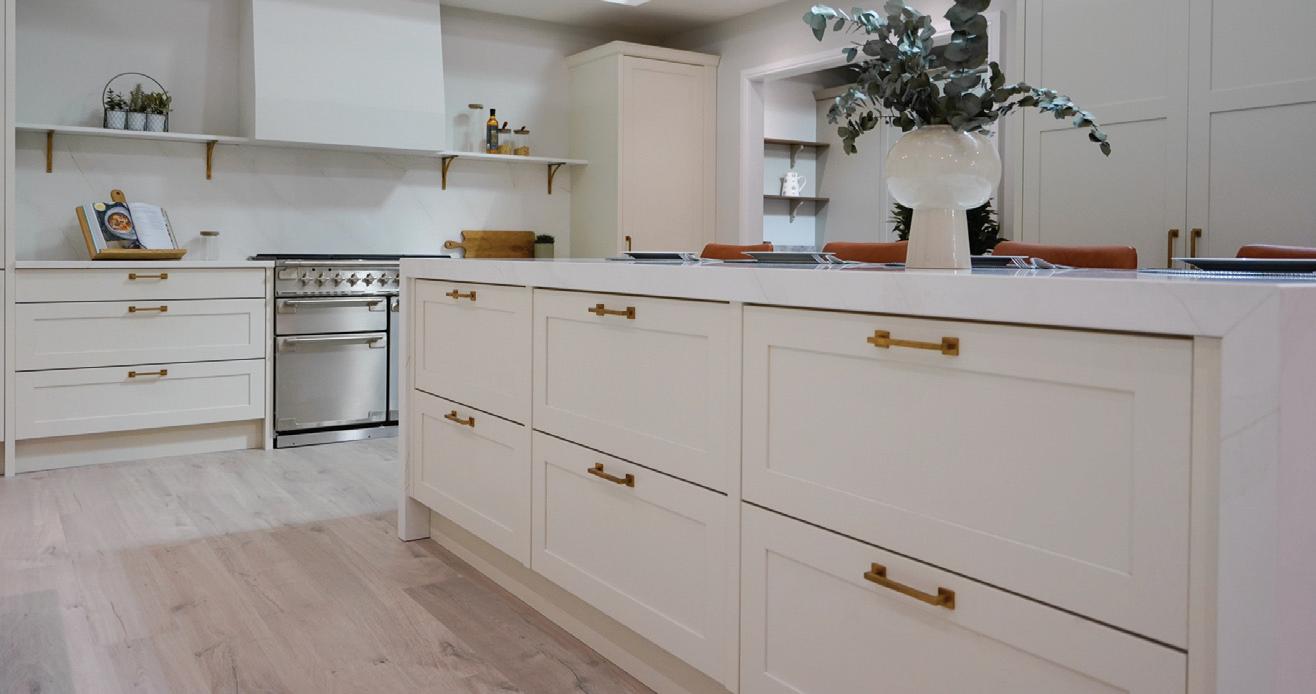
rich, in-frame effect door in June, which will allow consumers to achieve stunning designs with the in-frame look at a more affordable price point”, explains Sinead Trainor.
Certainly, the market for the in-frame aesthetic is strong and industry experts suggest it is set for continued growth over the next couple of years. Doug Haswell of Caple points out: “With in-frame kitchens already accounting for nearly 20% of our kitchen
sales, there’s a clear trend towards this style.” He believes in-frame sales will be buoyed by a greater variety of contemporary variations. Haswell adds: “This trajectory suggests a promising future for in-frame kitchens, with ongoing innovation and diversity in styles to meet market demands.” So, take a look at the variety of in-frame and in-frame effect kitchens on offer to satisfy both customer tastes and budgets.
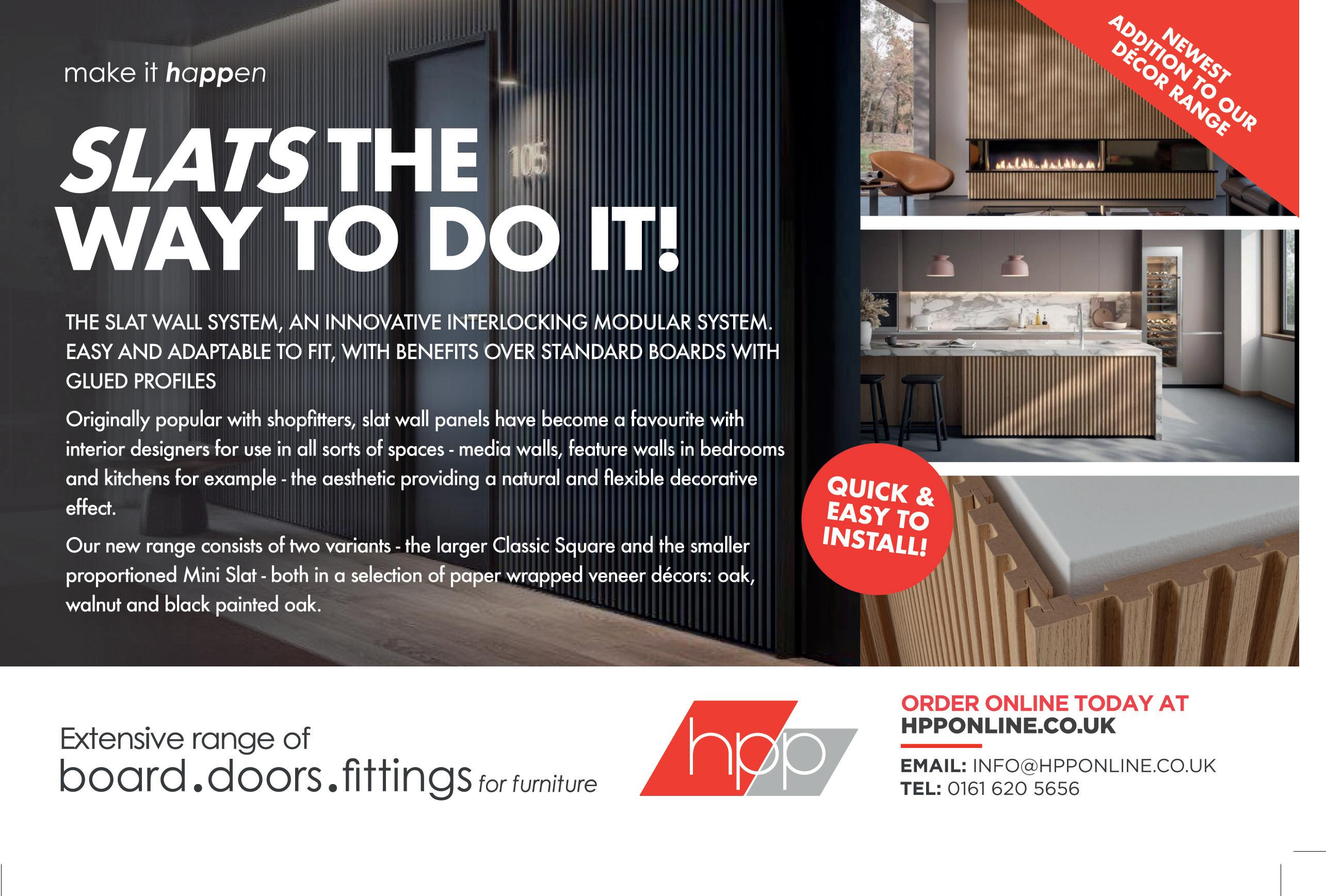
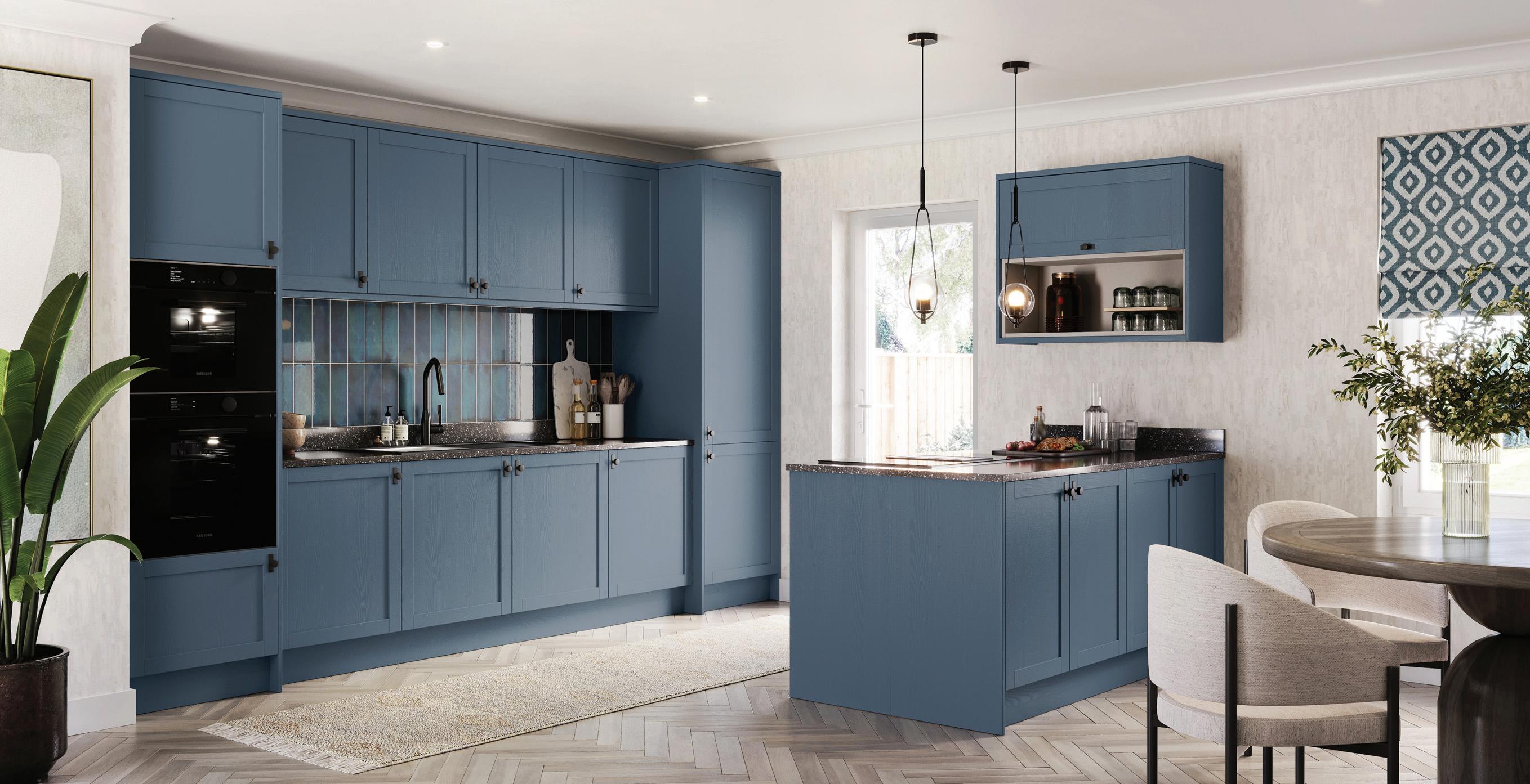
British furniture brand Lifestyle Kitchens has launched the Salsa collection, featuring a slim Shaker frame in a traditional woodgrain effect finish. Salsa comes in a choice of three colours: Aegean Blue, Cashmere, and Grey. Pictured here as a kitchen diner scheme in Aegean Bl ue, it includes a feature wall for storage and food preparation and is combined with a peninsula for cooking and serving meals. View the online brochure at www.rdr.link/KAZ009
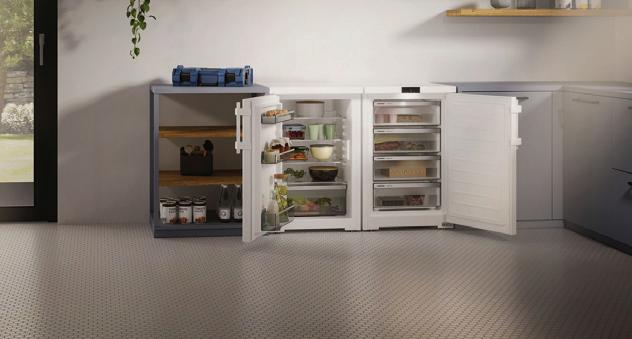
Cooling appliance manufacturer Liebherr has launched a new generation of undercounter fridges and freezers for small spaces. The 29strong collection spans the Pure and Plus series, offering a choice of heights and widths from 6980mm x 550mm up to 850mm x 600mm. In addition, it reportedly boaststhe industry’s first under counter appliances with a class C energy efficiency rating which Liebherr states is the best class rating in the undercounter cooling category. View all the fridge and freezers at www.rdr.link/KAZ010
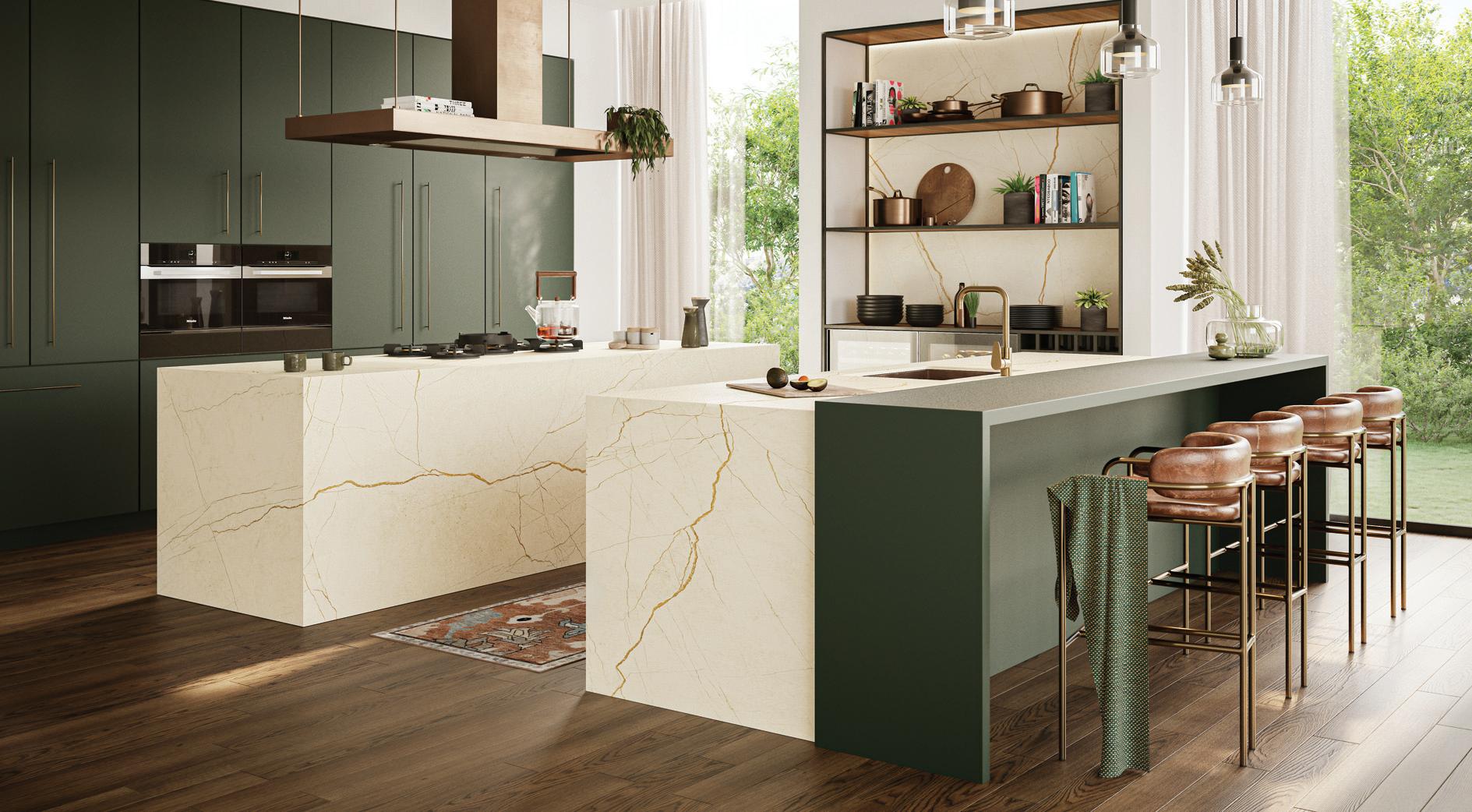
Premium surface manufacturer Caesarstone has launched the Time collection, drawing inspiration from stone forged over millennia. Boasting 10 designs, the Time collection includes three mineral surfaces, with low-silica content, and seven porcelain designs. It brings the total number of porcelain surfaces to 31 designs, and sees the introduction of Silk and Stone finishes, including Isobellia (pictured). Discover the entire collection at www.rdr.link/KAZ011

Italian appliance manufacturer Elicahas launched the Virtus-90TFT, an electric single oven with Hydrocleaning function. The oven offers a variety of cooking functions including conventional, fan grill, and pizza modes, has a temperature range of 30-300°C, and comes with a food probe thermometer. Virtus-90-TFT oven is also equipped with a system that allows for moist heat or dry heat cooking, by retaining or expelling vapour produced inside the cavity. Read the specification at www.rdr.link/KAZ012
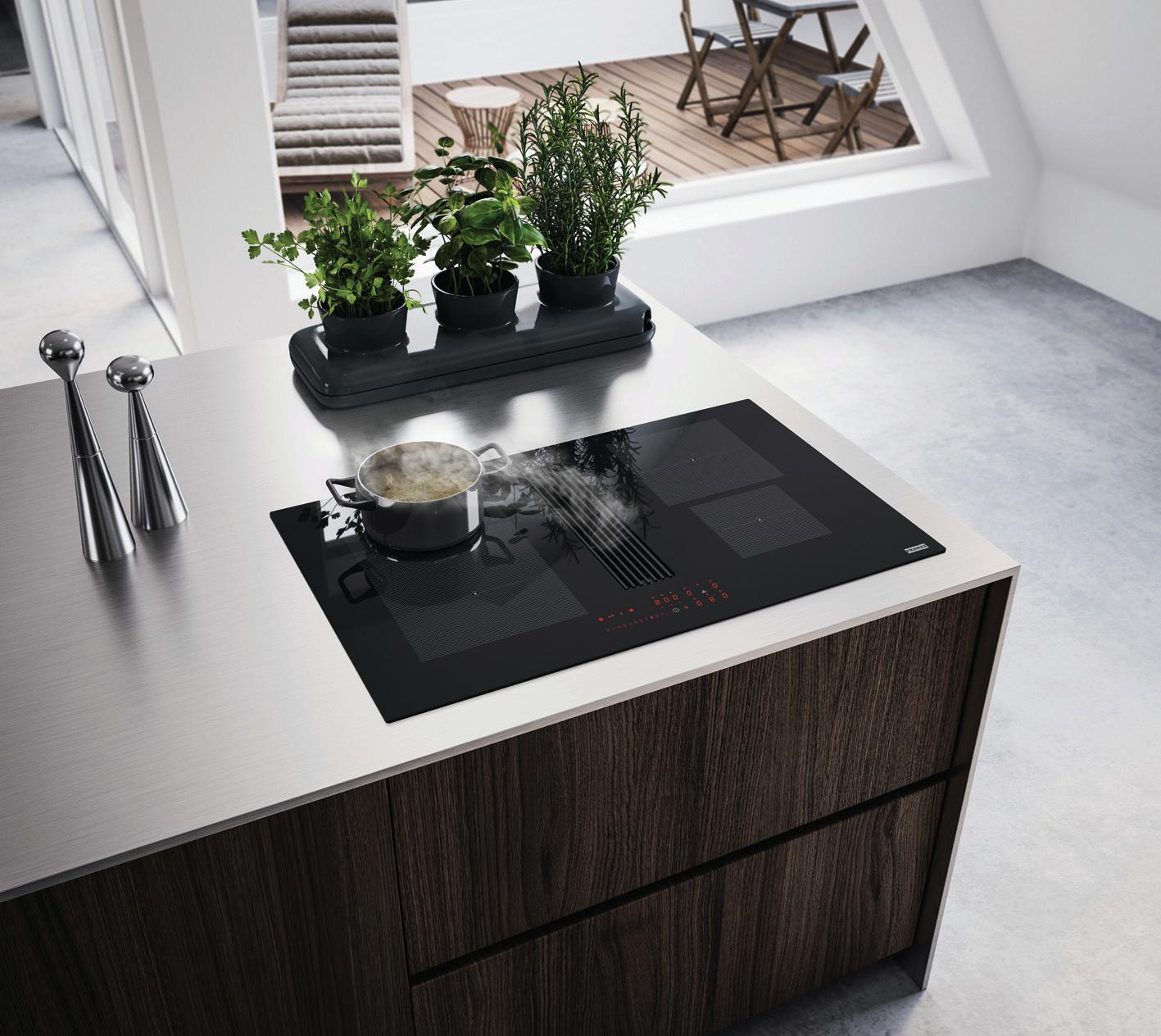
Franke has expanded its 2gether hob extractor offer with four new models, bringing the total to eight. The latest hob extractors include Mythos 2gether Icon Steel, Maris 2gether Steel, Maris 2gether Minimal Black and Smart 2gether Black Lines. All measure 830mm wide, except for the compact 700mm Smart 2gether Black Lines. They have an A+ energy rating, nine heat levels, filter which is replaceable from the top, and come in ducted or recirculating versions. Discover the range at www.rdr.link/KAZ013

Inspired by nature, baths have embraced fluid forms with organic curves to provide a relaxing space
Recognising the influence of nature on bathroom interiors, baths have embraced organic forms. It has seen a return of luxurious curved shapes and softened, rounded angles. Sales and marketing director of RAK Ceramics Ben Bryden explains why there has been a move towards shapely designs: “This change comes as people focus more on relaxation and natural beauty in their bathroom setups. The organic shapes, inspired by nature, bring a sense of calm and peace. Many people now want their bathrooms to feel like a spa, and these rounded, flowing baths create a cosy, welcoming vibe. This trend is part of a larger shift towards wellness, incorporating elements of nature into our living spaces.”
And product manager of Bathrooms to Love by PJH Julie Lockwood finds the influence of curves is reflected in her company’s bath sales. She explains: “We are seeing a growing demand for curvy, organic-shaped baths. A softening of angular forms gives rise to a more modern, flowing look – more curves which are key in creating tranquil and relaxing bathing spaces.”
Not only creating a gentle aesthetic, industry experts suggest the natural form provides a cosier experience. Managing director of Duravit UK Martin Carroll adds: “Organicshaped bathtubs provide a comfortable, aesthetically pleasing focus in the room.” While head of marketing at Bette Sven Rensinghoff explains:“Baths that are more organically shaped, as well as being extremely comfortable help to meet consumer demand for a truly relaxing bathing experience.” But curved can also offer practicalities too, making a space feel larger and with softened corners providing additional safety benefits, as head of Kaldewei UK Adam Teal points out: “These are perfect for family bathrooms and hotels alike, as there are no sharp angles or corners to consider.”
While the freestanding bath probably best illustrates the trend for organic lines, due to
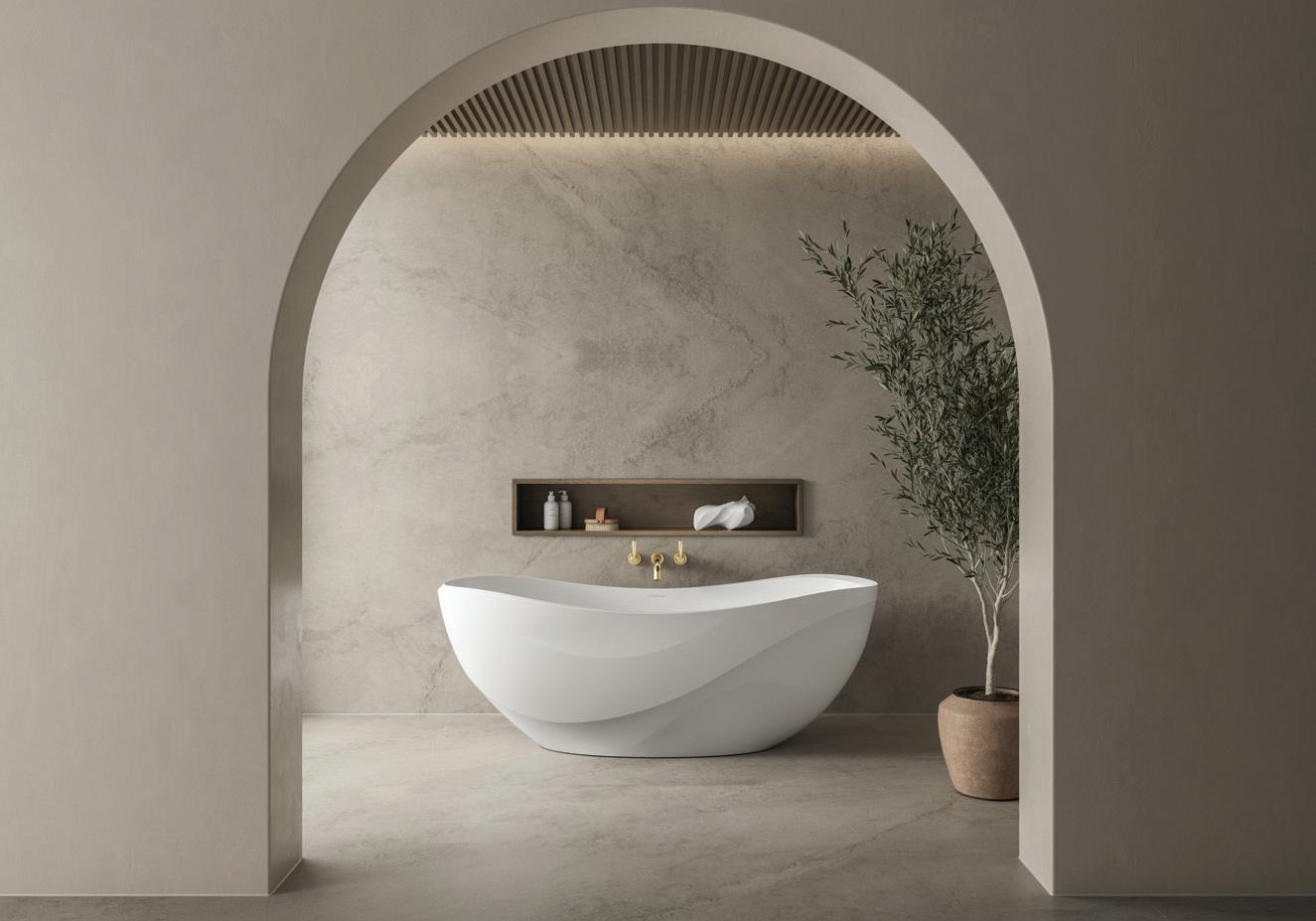
1. VICTORIA + ALBERT
In collaboration with British sculptor, Victoria + Albert offers Seros freestanding bath, in 1650 and 1800 models. View technical details at www.rdr.link/KAZ014

2. TISSINO
Angelo D is a twin-skinned acrylic bath, designed for fitting back-to-wall with pre-fitted waste and overflow. Download the technical spec at www.rdr.link/KAZ015
the sheer size of the tub, the styling is not the sole domain of this bath type. Curves have influenced all models. It includes back-to-wall baths, which provide the freestanding look but without the space requirements.
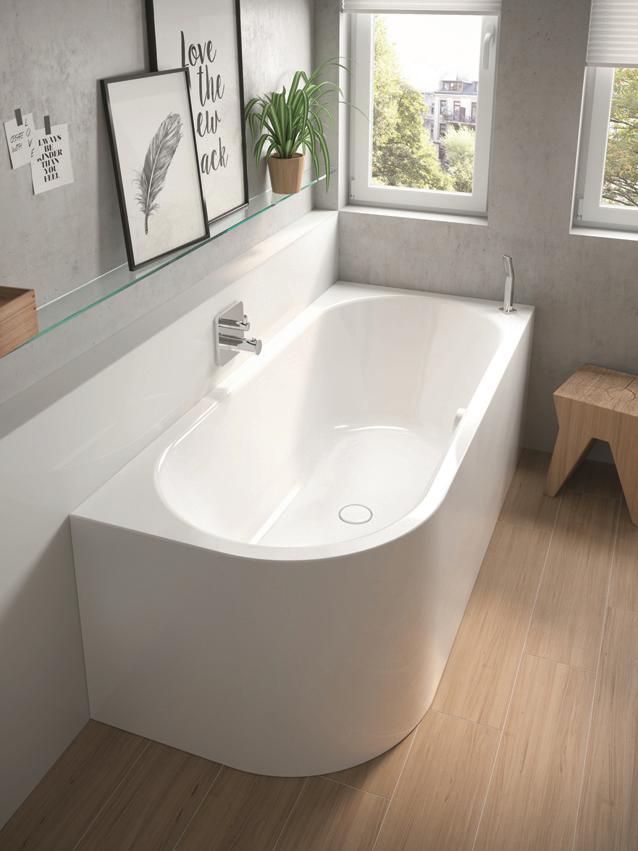
3. KALDEWEI
Available left or right handed, the Meisterstruck Centro Duo Corner features enamelled waste cover and overflow knob integrated in the design. See the specification at www.rdr.link/KAZ016
Designers seeking to create a stylish, wellness spa, need look no further than a bath with graceful, flowing lines to create a relaxing environment and instantly provide curve appeal.
Head of marketing at BC Designs Jon Walker says investing in a new bathroom suite can typically add up to 5% on to the value of a home, as well as helping a home to sell quicker.

Bathrooms have gone from once-humble room just a few years ago to a space where homeowners invest time and money into getting it right. This shift has been fuelled by the demand for beautiful aesthetics, wellness and a space that supports homeowners needs for better living. This is coupled with the fact that people are travelling more and staying in hotels with luxurious en-suite bathrooms, which they look to replicate in their own home. The once traditional boundaries that we associated with bathrooms are dissolving and are now regarded the same as bedrooms
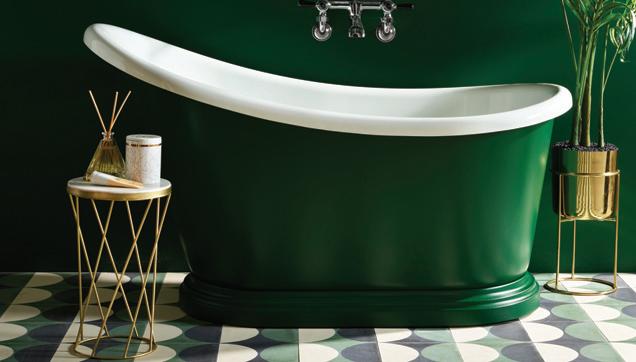
– as sanctuaries and places to switch off. This means that they require a higher level of attention to be paid to the design, so that the lighting, colours and materials chosen to reflect the room’s changing status.
One product that shouldn’t be overlooked as part of the design process is a bathtub. For some homeowners, there is a desire to remove a bath as a space-saving solution and install larger showers. However, while it might seem like a great idea initially, as a retailer, it is important to educate on what this can mean long-term from both a practical and value position.
Even if the square footage of the bathroom is considered small, there are now many models on the market that designers can specify that would allow a bath to be comfortably installed,
and without having to compromise on style. Many popular freestanding baths are now available in smaller versions, with a starting footprint as little as 1360mm.
Demand for freestanding models continues to rise, with research finding that this type of bath features in the top 5 of the ultimate property wish list.
Contemporary freestanding bathtubs are becoming more popular since they are regarded as the centrepiece within modern bathroom design. There are several advantages to them. There is a reduced installation cost, and they can be located anywhere in the room, even in the centre, or bedroom! It is a trend that we continue to see being used in the home. The role of bathrooms and bedrooms are now firmly intertwined, as the ultimate rooms in the home in which to switch off and relax and so there is a strong argument as to why having a bath in a bedroom can make logical sense.
Discover more about the bath collection at BC Designs at www.rdr.link/KAZ017
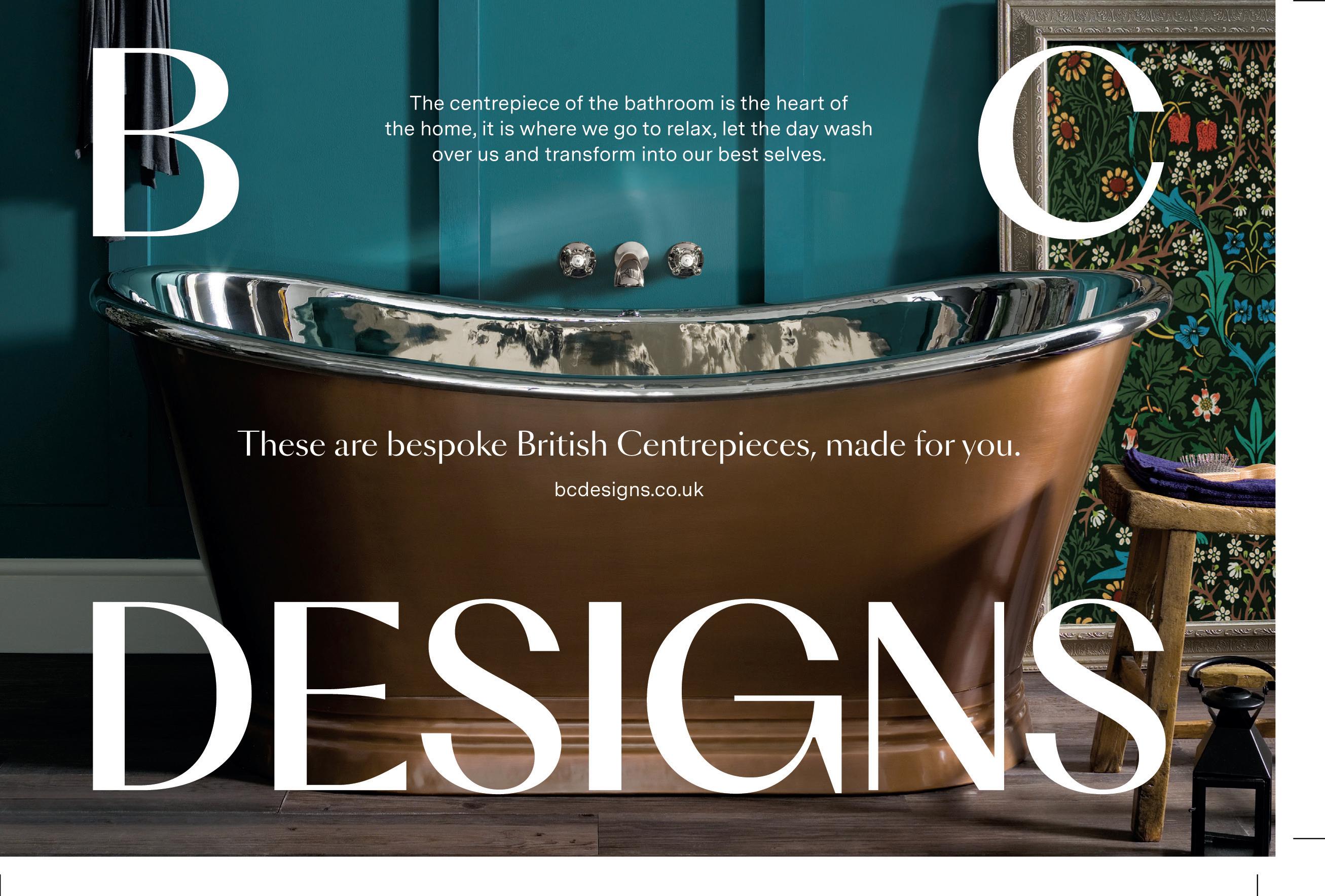
After colours and increased size options, KBN reports the greatest trade ups in shower trays may not be immediately obvious to bathroom designers
Since the launch of the first low-level shower tray, the natural evolution has been for it to become a homogenous part of bathroom design. It has seen the requirement of the tray to co-ordinate with elements of the room such as shower profiles or furniture, and totally blend into the floor, if required, in matching gloss or matt decors and with colour coordinated wastes. Marketing manager of Frontline Bathrooms Hayley Bowman comments: “We’ve been able to offer this option to customers on our Structure slate trays by having colour matched grills, so the tray looks one piece, with an invisible waste.”
So, while the presence of the shower tray may not necessarily be a focal point in bathroom design, nonetheless the understated aesthetics are significant to creating a complete wellness space. After a variety of colours and sizes, some may argue the greatest design developments and trade-ups in shower tray are those that aren’t immediately obvious or sometimes even visible.
Premium bathroom designers will be aware low-level shower trays blur the aesthetic and physical boundaries between tray and shower floor. But this demand for low-level access is now growing across the board, and is fast becoming a staple in bathroom design. Managing director at Duravit UK Martin Carroll points out: “Shower rooms featuring low-level trays have become the most popular solution for mainstream housing developments.” And head of sales at Kaldewei Adam Teal explains why: “A floor-level shower surface creates a seamless transition from shower surface to the floor, making the bathroom appear larger.”
However he adds: “They are also perfect for multigenerational families, maintaining a stylish appearance but with no edges to trip over they are easy to access.” Add anti-slip to the showering surface equation, and the lowlevel shower tray is among the answers to inclusive bathing – meeting the needs for all ages and all abilities.
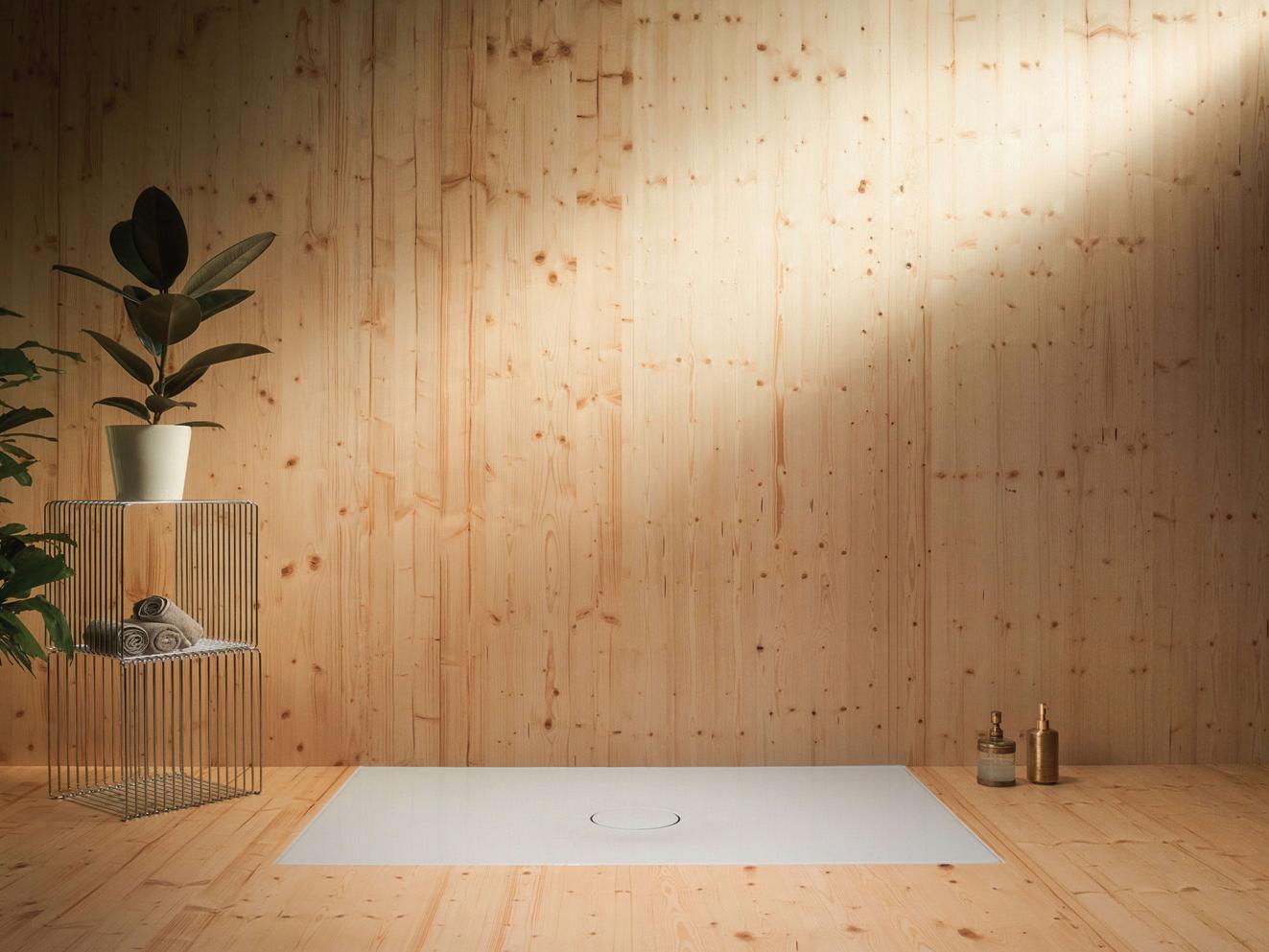
In fact, bathroom experts state anti-slip Is one of the most requested features for shower trays. Head of marketing at Tissino Helen Ray-Dennett says: “Anti-slip properties incorporated into the tray is the fastestgrowing innovation we have seen in recent years for the tray category.” This is reflected at Kudos, as sales and marketing director Nick Graville adds: “Slimline trays with anti-slip features are fast becoming our best-selling lines.” And there are a number of ways antislip can be incorporated from the form through to natural properties of the material, or even an ‘imperceptible’ finish. With the increasing rise in house prices, anti-slip low-level shower trays not only benefit generations living together now, but encourage consumers to think what may happen in the future.
And shower tray manufacturers are looking further at how they can create low-level showering for more property types, by helping
solve installation dilemmas. These span models that offer a variety of sizes, heights and installations, such as on the floor, semirecessed or installed flush, through to trays which can be cut on-site or offering a variety of waste options. Sales and marketing director at Kudos Nick Graville comments: “Our most recent product, the Ultimate shower tray, which has been tested in a select few retailers’ pre-launch, has been designed to solve a number of design dilemmas. It is super light, so it is easier to transport in large sizes and to awkward places. It can be cut to size on-site, and it is even slimmer at just 27mm in height.”
But there has also been a focus on what lies beneath – such as joists and even leg installation kits – further broadening the options for low-level shower tray installation. Managing director at Matki Nicholas Cunild comments: “Matki Continental Linear Shower Trays have the ability to select a waste position. This helps avoid a joist.” Although Kudos offers the
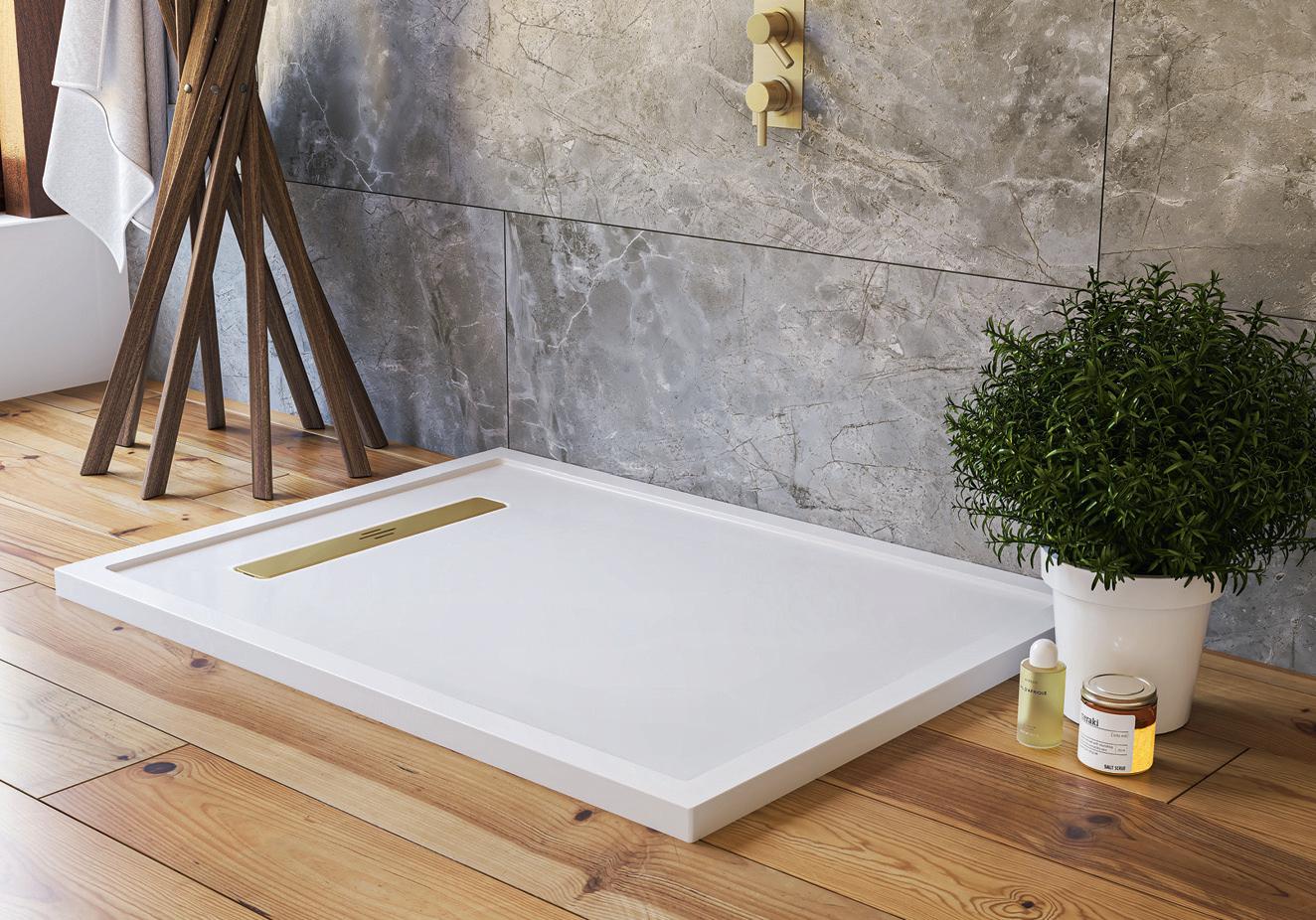

Measuring 27mm high, the Ultimate shower tray comes in two slate finishes. Watch the video at www.rdr.link/KAZ020
Connect2 shower tray, with a dual waste to avoid floor joists, it is also working on differing showering tray solutions. Nick Graville states: “We have recently trialled a shower tray that offers the option of a
bespoke waste position.”
Whereas Bette has introduced the BetteLevel to ease the mounting, levelling and adjusting height of shower tray. According to the company, it makes tray
installation easier and faster.
While outwardly the low-level tray design is reduced to a bare minimum, the fullness of the design is the complexity to meet the needs of a wider populace.
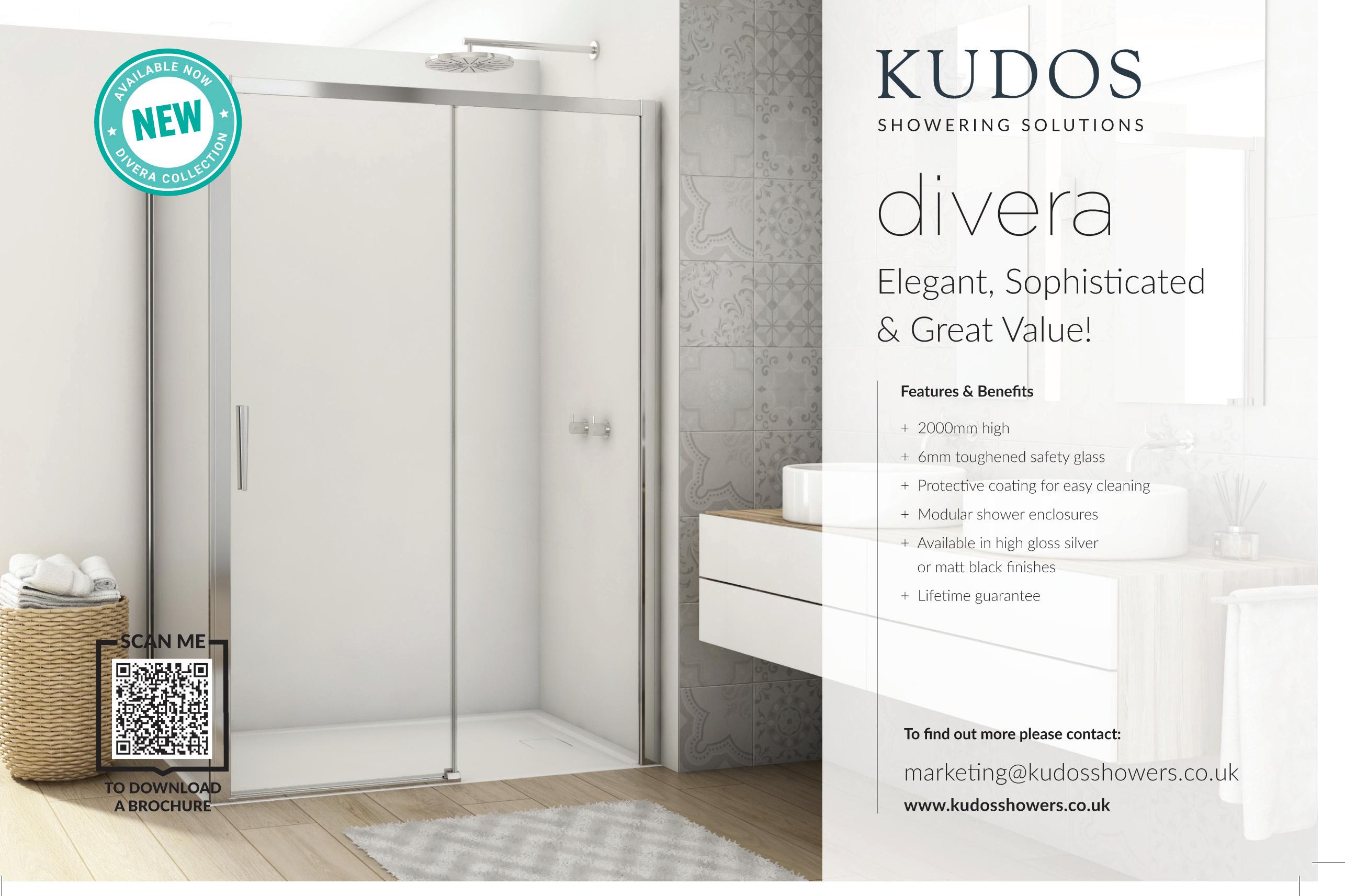 3. KUDOS
3. KUDOS
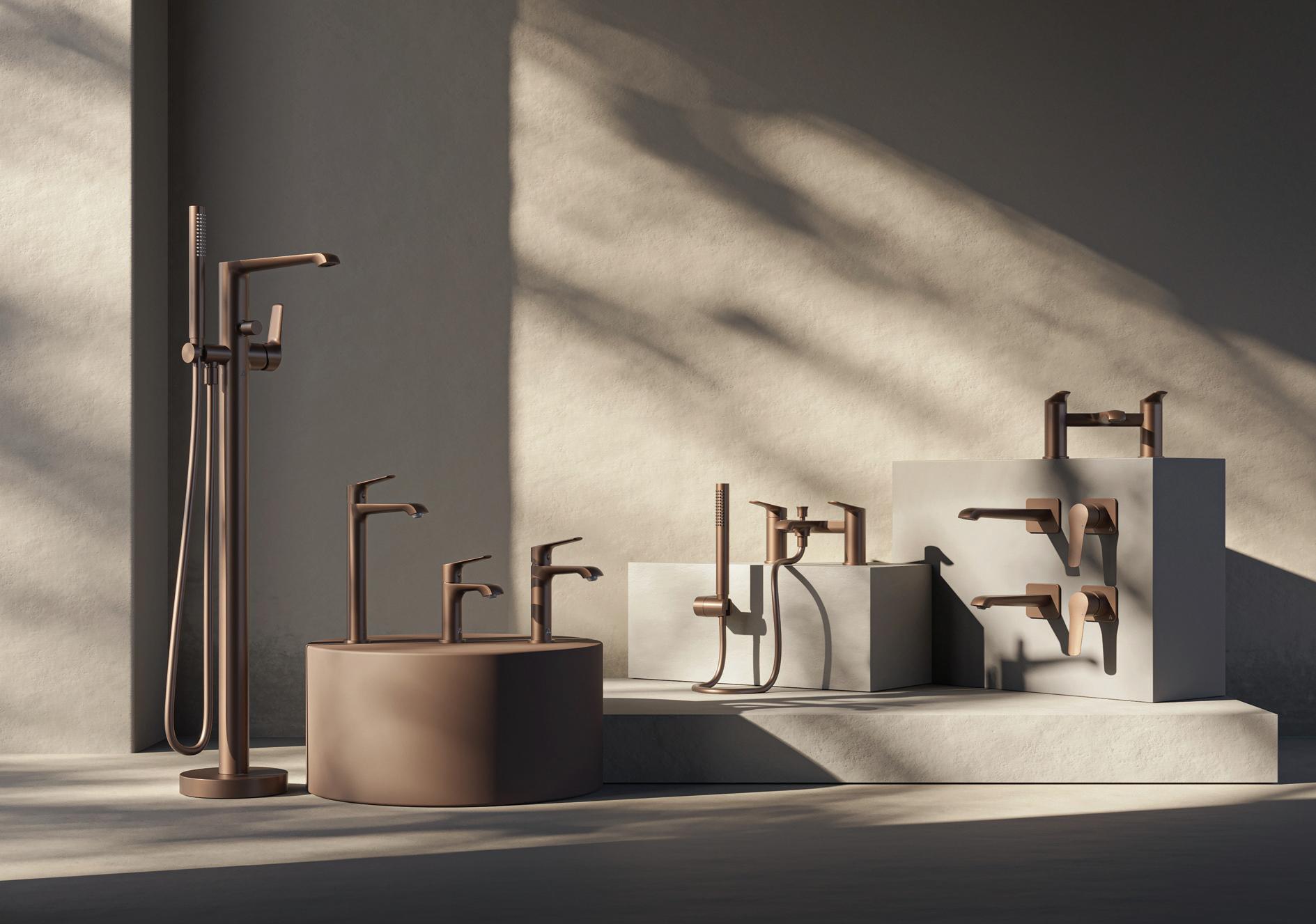

Brassware supplier Vado has expanded its portfolio with the launch of Cameo, a collection featuring sanitaryware and furniture – a first for the brand. Boasting a soft square design, the collection encompasses vanity units, ceramic and mineral basins, illuminated mirrors, brassware and accessories. Cameo is offered in a range of colour options, spanning Cove Blue vanities through to Matt White brassware and satin brass LED mirrors. Browse the entire collection at www.rdr.link/KAZ022
Brassware brand Aquallahas added Brushed Bronze to existing finishes in its portfolio. Brushed Bronze is available across the Hanna range,Solaris Flush Plates, Design Collection Showers, Luca Radiators and Valves, to provide colour consistency across the collections. Hanna spans a selection of taps including basin monoblocs, wallmounted bath fillers and freestanding bath/shower mixers which also come in Brushed Nickel. Discover details about the Hanna basin mono at www.rdr.link/KAZ021
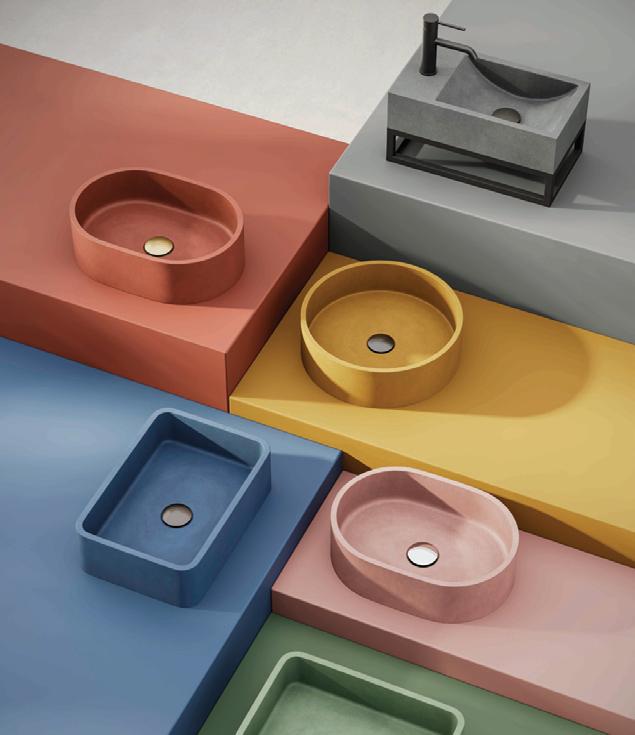
As part of its Sanitaryware collection, HiB has introduced vessel basins made from concrete, ceramic and mineral marble. Entero basins are manufactured from concrete in a range of shapes including round, pill and rectangle. The matte basins come in six colours, spanning Amber Yellow through to Dusky Pink, Spring Green and Cobalt Blue. Download the brochure at www.rdr.link/KAZ023
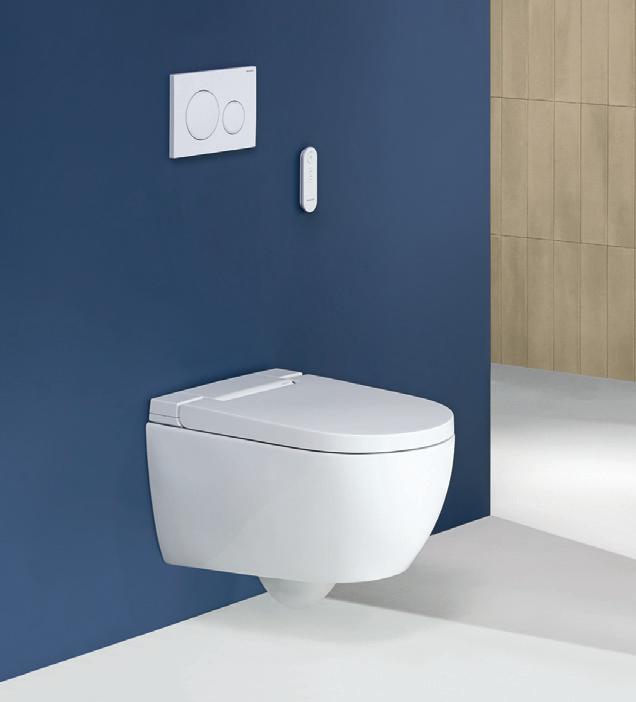
Bathroom manufacturer Geberit has introduced the AquaClean Alba, an entry level shower toilet for the brand. Alba features WhirlSpray technology and TurboFlush 2.0, designed to offer optimum and quiet cleaning of the pan. It offers heated water, with an automatic descaling program for ease of maintenance, and comes with a remote control and integration with Geberit Home app. Discover more details at www.rdr.link/KAZ024
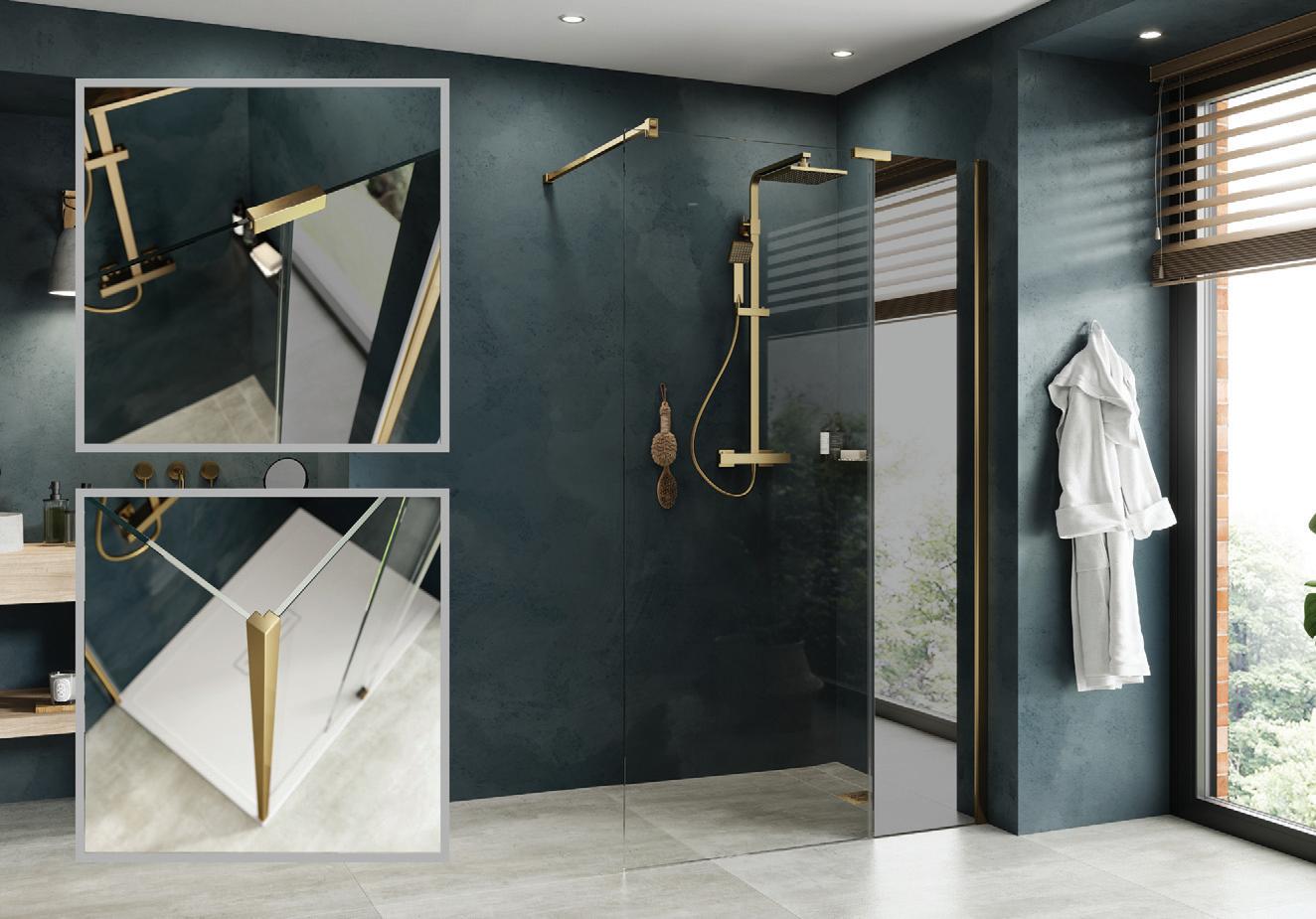
Created for use with its Ultimate wetroom panels, Kudos Showers has introduced a range of interconnectors, glass-to-glass corner posts, corner profiles and mirrored décor panels. The interconnector joins panels to create a larger showering area, and can be used to incorporate coloured glass panels or add a mirrored décor panel. Both the interconnector and glass cornerto-corner posts come in four finishes and the mirrored décor panel measures 1950 high. Download Kudos brochures at www.rdr.link/KAZ025

Offering support for independent kitchen and bathroom firms because your business is our business

If you’re going to make any changes to your marketing strategy in 2024, it should be making your ad creative work harder, for longer, says managing director at Door4 Sean Dwyer
There’s been a long-held belief in the advertising industry that consumers quickly tire of ad campaigns and new, fresh creative is constantly required for ads to be effective. I believe this is down to two factors:
● Marketing attracts “ideas” people, who get bored and need change
● A widely held belief, possibly driven from decades of the above, customers ‘tire’ of ads (also known as advertising wear out).
But when marketing budgets are tight, this constant churn of new creative could be seriously hindering your marketing effectiveness and return on investment. In fact, studies have proved ‘advertising wear out’ just isn’t true. The data even shows better-performing ads can increase in effectiveness over time.
The need for ‘fresh’ is even more prevalent in the kitchen and bathrooms market, owing to the nature of this sector - consumers are so rarely “in market”. It can become tempting for brands to “refresh” because they’re bored. There are also changing trends to contend with. Photography, CGI and assets are continuously created for websites, brochures, and general collateral. Too frequently, I hear from clients “well we need to have the new shot of x in our ads” or “while we’re doing that shoot, why don’t we…” The risk is that we create inconsistency and become three degrees removed from the original strategy and focus.

The key to a successful campaign is to focus on building memory structures. This comes from consistency (having the same/similar tone to everything we do), and memorability. As an example, M&Ms have run the same TV ad for nearly a decade, it’s not any funnier now than it was back then –but it’s memorable and consistent!
In homes and gardens no one does it more consistently than B&Q. Blessed with hefty budgets, they have freedom to tell stories, but crucially they are that size because of their historical consistency and memorability, allowing them to continue to leverage that equity. “You can do it, when you B&Q it” and THE orange has been around since the late 60s.
It’s also important to remember customers don’t want “different” –human beings want familiarity to build recognition and memory structures. In fact, 85% of digital ads don’t receive the required 2.5s to build mental availability. Thus proving repetition in this space is even more necessary to create cut through.
So how can retailers in the kitchen and
bathroom sector make their budgets work harder in 2024? The simple answer is to spend it on media and not replace existing creative. As an agency focused on maximising impact and minimising wastage, a common conversation with clients is to get the creative right and less is more! It’s simple; speak to the same audiences, in the same way as often as you can. Lean into core ads. New and fresh may be fun for marketers but it’s detrimental to your audience.
Of course, you need your ads to be hitting the right mark in the first place. But once you’ve done that, it’s about working those assets hard. Not being afraid of repetition and never being too quick to switch up an ad campaign based on the belief that your audience may be tiring of it.
The online world is busy and noisy and our attention spans are getting shorter. Instead of changing your creative with every season or campaign, consistently delivering your key messages to your target segments will help you get one step beyond the competition. Your investment in memorability is like compound interest, it pays off exponentially.
Discover more about Door4 at www.rdr.link/KAZ026


Founder of Foyne Jones Recruitment Group Peter Jones looks at the new rules and employment rights which have come into effect, and how best to ensure your business can meet these crucial changes going forward
From statutory rates to flexible working and redundancy rights, it is your responsibility as a business owner to ensure all your employees under contract are fully protected by current legislation. With further changes in employment law expected in July and September, it makes sense to get ahead of the game.
A few of the changes that UK businesses will face from now on include adjustments to holiday entitlement, pay for part-time and irregular hour staff, as well as increased statutory payments and revised minimum wage bandings. If you’re paying staff at or close-to the national minimum wage, you must ensure compliance with the new thresholds. Plus, you need to know about new redundancy rights, updated rules for paternity leave and increased compensatory rates at tribunals.
Given the way the workplace has changed in the past decade (or two!) I think we can agree
it makes sense to anticipate increased flexibility going forwards as the UK adapts to an ageing population, 24/7 ’always on’ culture and more recently, growing use of AI. Remember, workplace legislation is there to protect everyone. Make it. clear from the very outset the expectations and company policies within a business. Here’s a quick checklist, which you can use to ensure your policies are up to date on the latest regulations.
1:Review your procedures around leave, flexible working, harassment, redundancy, tips – any that are affected by the updates. Then, amend them in line with the new legal requirements.
2:Update your policies and handbooks so they cover all the changes and how your business will manage them.
3:Ensure you have new, separate policies with information around each update, and clear reporting procedures.
4:Organise staff training to underline and re-establish codes of conduct and how to manage all these new processes. Managers and team leaders will need to understand how to handle new leave requests and ensure everything is done promptly and in line with the law.
5:Make sure any office software you use for managing leave requests has been updated to cover new types of leave.
You need to make sure you are fully prepared for any questions that new and existing staff might have. In an ideal world, you’ve already put these measures in place and informed your people of the changes, but we all know that life happens, and day-to-day work often takes priority.
This is why I strongly recommend you consider speaking to a recruitment consultant who can ensure you’re fully covered when onboarding new staff or reviewing current roles. Just as the KBB industry has its own language, so does the world of employment law. This is why I recommend having a frank and open conversation with a specialist recruiter who is well-versed in the current requirements so you’re always fully prepared.
In my experience, it pays to anticipate how your business will tackle everything from policies on flexible working to paternity leave alongside salaries and benefits, which may be linked to length of service, for example. We all know life can change in a heartbeat when it comes to bereavement, separation and becoming a parent so it pays to future-proof your business so you can bring in cover or contractors if required. Making sure your business adheres to the very latest employment laws will help you continue to attract and retain top-tier talent and, of course, keep your business lawful.
Find out more about Foyne Jones recruitment services at www.rdr.link/KAZ027
What has been driving KBN’s website traffic?
Here are the top three stories with the biggest hits in April on www.kandbnews.co.uk
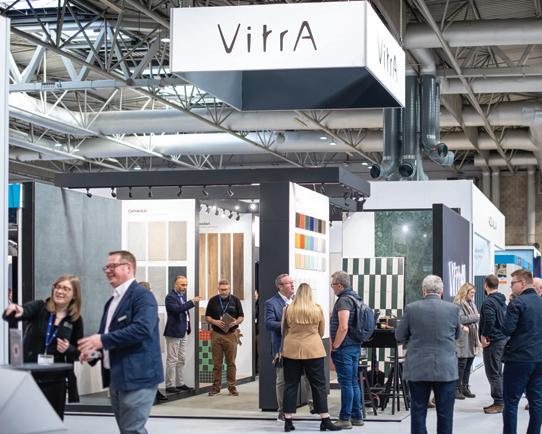
We identify top takeaways from Kbb Birmingham 2024, which will be a focus for retail. These include suppliers expanding their product categories to become a one-stop shop, manufacturers reaching into other spaces in the home, the trend for personalisation, and pastels and bold dopamine colours. These were joined by connected appliances and a focus on sustainable design. See the report at www.rdr.link/KAZ028
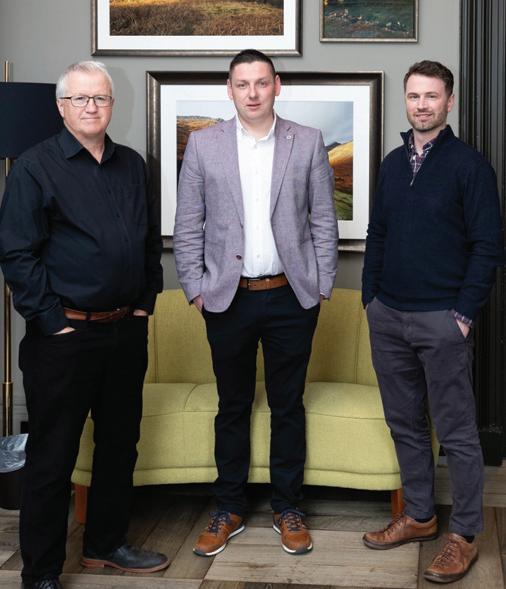
Northern Irish KBB furniture manufacturer Woodlands Kitchenshas acquired Dundee-based JTC Furniture Group, backed by investor BGF. Foundedin 1987 by Brian McCloskeyas a kitchen showroom in Ballymena, Woodlandsis now led by his son Connor and supplies KBB furniture to national clients, with a turnover of over £25m. JTC is a Scottish fitted furniture manufacturer, focused on the social housing and student accommodation markets. Read the full story at www.rdr.link/KAZ029

Kitchen furniture group Nobiahas unveiled plans to close its West Yorkshire-based manufacturing site, as part of its ongoing UK transformation strategy. The company will relocate its current manufacturing in Halifax, West Yorkshire, to its Darlington site, in County Durham, with the building in Halifax set to be repurposed as a storage facility. Approximately 60 full-time employees in Halifax will be affected by the consolidation. View the story at www.rdr.link/KAZ030
Here is a useful summary of all the adverts that appear in this issue of Kitchens & Bathrooms News. Each is listed with its page number and a direct URL that will get you straight to the relevant online information.
BC Designs........................................................................(page 27)
www.rdr.link/KAZ100
BIKIBB................................................................(inside back cover)
www.rdr.link/KAZ101
Burlington..........................................................................(page 31)
www.rdr.link/KAZ102
Franke UK Ltd......................................................................(page 9)
www.rdr.link/KAZ103
Hill’s Panel Products Ltd..................................................(page 23)
www.rdr.link/KAZ104
KBSA Conference..............................................................(page 10) www.rdr.link/KAZ105
Kinedo/Saniflo UK Ltd........................................................(page 4) www.rdr.link/KAZ106
Kudos Shower Products Ltd............................................(page 29) www.rdr.link/KAZ107
Roper Rhodes Ltd............................................(inside front cover) www.rdr.link/KAZ108
Symphony Group PLC......................................................(page 20) www.rdr.link/KAZ109
TLW Global........................................................................(page 25) www.rdr.link/KAZ110
Waterline......................................................................(back cover) www.rdr.link/KAZ111

